|
|

This Sunday and Beyond - December 25th
Get it in PDF form with calendar
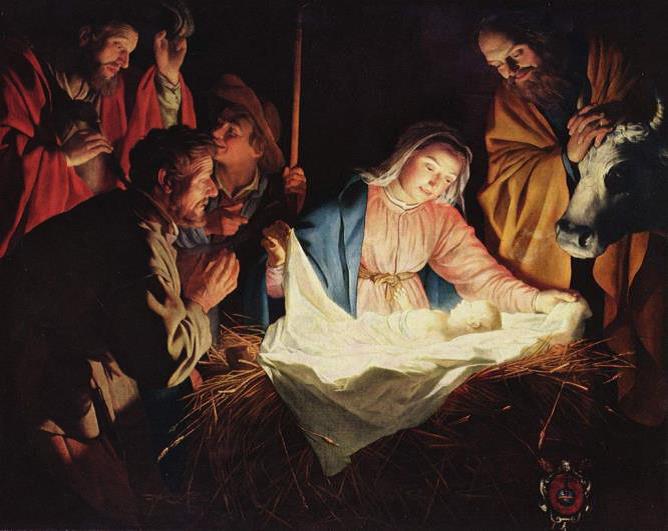 Several weeks ago a friend shared that everywhere he turned, whether on the news or in personal his interactions, he was seeing people struggling with some combination of fear, hurt, anger, and anxiety. As his awareness grew, he began praying for all those suffering in that way, that by the grace of God they would be freed to fully receive our Lord with peace and joy at Christmas. I was happy to join him in that prayer, and now that Advent is coming to an end, I think our next step is to make sure that we fully receive him in our own Christmas celebrations.
Several weeks ago a friend shared that everywhere he turned, whether on the news or in personal his interactions, he was seeing people struggling with some combination of fear, hurt, anger, and anxiety. As his awareness grew, he began praying for all those suffering in that way, that by the grace of God they would be freed to fully receive our Lord with peace and joy at Christmas. I was happy to join him in that prayer, and now that Advent is coming to an end, I think our next step is to make sure that we fully receive him in our own Christmas celebrations.
Fully receiving Jesus means more than just exchanging gifts and spending time with the people you love. Those are great blessings and we should treasure them, but by themselves they don’t bring deep or lasting change to our lives. Eventually their effects fade, and things tend to go back to the way they were, and that’s not at all the way Isaiah (Is 9:2-6) and Luke (Luke 2:1-20) describe the Messiah’s arrival. Light shines on those living in deep darkness. Fear is cast out and the people are freed from burdens and oppression. The joy of the people is multiplied and they praise and glorify God. The birth of Jesus transforms everything when we experience it not as an event, but as the invitation to share our whole lives with him.
This is our next step because as we share our lives with Jesus we ourselves become an invitation to others, like the shepherds in Luke’s gospel. Having received this “good news of great joy,†they leave the wilderness and go with haste to see Jesus for
themselves and share what they’ve seen and heard. Then, even though they return to their flocks, they go back praising and glorifying God, the message still on their lips.
As we prepare to receive our Lord, think about what in your life needs to be transformed by his coming, and set expectations high enough that Isaiah and Luke wouldn’t be disappointed. We need to see Jesus for ourselves – not secondhand, but in our own lives. We have to become that invitation, because that’s exactly what so many who are living in darkness or wandering in the wilderness desperately need – to hear a message of hope and see that it’s real.
Father McQueen
Readings for this Sunday:
Isaiah 9:2-4, 6-7 Psalm 96:1-4, 11-12 Titus 2:11-14 Luke 2:1-20
|
RETURN TO TOP
This Sunday and Beyond - December 25th
Get it in PDF form with calendar
 Several weeks ago a friend shared that everywhere he turned, whether on the news or in personal his interactions, he was seeing people struggling with some combination of fear, hurt, anger, and anxiety. As his awareness grew, he began praying for all those suffering in that way, that by the grace of God they would be freed to fully receive our Lord with peace and joy at Christmas. I was happy to join him in that prayer, and now that Advent is coming to an end, I think our next step is to make sure that we fully receive him in our own Christmas celebrations.
Several weeks ago a friend shared that everywhere he turned, whether on the news or in personal his interactions, he was seeing people struggling with some combination of fear, hurt, anger, and anxiety. As his awareness grew, he began praying for all those suffering in that way, that by the grace of God they would be freed to fully receive our Lord with peace and joy at Christmas. I was happy to join him in that prayer, and now that Advent is coming to an end, I think our next step is to make sure that we fully receive him in our own Christmas celebrations.
Fully receiving Jesus means more than just exchanging gifts and spending time with the people you love. Those are great blessings and we should treasure them, but by themselves they don’t bring deep or lasting change to our lives. Eventually their effects fade, and things tend to go back to the way they were, and that’s not at all the way Isaiah (Is 9:2-6) and Luke (Luke 2:1-20) describe the Messiah’s arrival. Light shines on those living in deep darkness. Fear is cast out and the people are freed from burdens and oppression. The joy of the people is multiplied and they praise and glorify God. The birth of Jesus transforms everything when we experience it not as an event, but as the invitation to share our whole lives with him.
This is our next step because as we share our lives with Jesus we ourselves become an invitation to others, like the shepherds in Luke’s gospel. Having received this “good news of great joy,†they leave the wilderness and go with haste to see Jesus for
themselves and share what they’ve seen and heard. Then, even though they return to their flocks, they go back praising and glorifying God, the message still on their lips.
As we prepare to receive our Lord, think about what in your life needs to be transformed by his coming, and set expectations high enough that Isaiah and Luke wouldn’t be disappointed. We need to see Jesus for ourselves – not secondhand, but in our own lives. We have to become that invitation, because that’s exactly what so many who are living in darkness or wandering in the wilderness desperately need – to hear a message of hope and see that it’s real.
Father McQueen
Readings for this Sunday:
Isaiah 9:2-4, 6-7 Psalm 96:1-4, 11-12 Titus 2:11-14 Luke 2:1-20
|
RETURN TO TOP
This Sunday and Beyond - December 18th
Get it in PDF form with calendar
 As we get closer and closer to the birth of Jesus, it’s appropriate that on the last Sunday of Advent we’re presented with an important part of every pregnancy: naming the child, which can sometimes be a real struggle for expectant parents. Possibilities are often rigorously examined for things like rhyming potential and unfortunate associations, and subjected to additional third-party testing, based on the availability of honest but non-judgmental friends. Parents do all these things because they know that the child’s name will be a significant part of the foundation their identity will be built on, and we see this in the Bible too. Names always reveal the person’s identity and mission, so any time we see God giving a name, we should pay special attention, especially if that person is God’s own Son.
As we get closer and closer to the birth of Jesus, it’s appropriate that on the last Sunday of Advent we’re presented with an important part of every pregnancy: naming the child, which can sometimes be a real struggle for expectant parents. Possibilities are often rigorously examined for things like rhyming potential and unfortunate associations, and subjected to additional third-party testing, based on the availability of honest but non-judgmental friends. Parents do all these things because they know that the child’s name will be a significant part of the foundation their identity will be built on, and we see this in the Bible too. Names always reveal the person’s identity and mission, so any time we see God giving a name, we should pay special attention, especially if that person is God’s own Son.
In giving us a way to address him God opens up the possibility of relationship, and in the lesson from the prophet Isaiah, he shows us how badly he wants us to have one. When his people are falling away under the wicked King Ahaz, God sends Isaiah to call them back and even offers to provide a sign as a pledge of his love. When that’s rejected, God doesn’t give up but promises a sign anyway: that a young woman (which can also be translated “virgin,†as Matthew does) will conceive and bear a son, and call his name “Emmanuel,†which means “God with us.†In giving that name, God is saying, “Even if you won’t come to me, I will come to you.†Then in the gospel lesson, Matthew tells us that not only is Mary’s child this promised “Emmanuel,†but that he will be called “Jesus,†or “God saves,†because he will save his people from their sins.
Once my wife and I decided on the names of our children, I remember feeling the relationship become so much more personal that it was like they’d already been born in some way. Try to imagine what Mary and Joseph must have been experiencing as
Joseph’s dream about the coming of Jesus
they contemplated the names God had given their child and what they might mean. If you’re baptized, consider also what it means for Jesus to be living in you, and that he has chosen you as a means of coming to those who won’t come to him. At all times, and in these last days especially, keep those names on your lips and in your heart, so that he can reveal himself to you and those around you.
Father McQueen
Readings for this Sunday:
Isaiah 7:10-17 Psalm 24 Romans 1:1-7 Matthew 1:18-25
|
RETURN TO TOP
This Sunday and Beyond - December 11th
Get it in PDF form with calendar
 Throughout the season of Advent the Church gives us Isaiah’s prophecies to help us join the people of Israel in their waiting for the Messiah. We’re reminded of the promises of healing and peace and then watch them being fulfilled through Jesus. Then, just in case we’re not getting it, Jesus connects the dots for us, explicitly pointing to his works as irrefutable proof that he is in fact the one they’ve been waiting for. That seems like cause for rejoicing, so why does Jesus then add, “And blessed is he who takes no offense at me� Because unfulfilled desires and expectations are often what separate us from Jesus and leave us blind to the miracles he’s working in our lives.
Throughout the season of Advent the Church gives us Isaiah’s prophecies to help us join the people of Israel in their waiting for the Messiah. We’re reminded of the promises of healing and peace and then watch them being fulfilled through Jesus. Then, just in case we’re not getting it, Jesus connects the dots for us, explicitly pointing to his works as irrefutable proof that he is in fact the one they’ve been waiting for. That seems like cause for rejoicing, so why does Jesus then add, “And blessed is he who takes no offense at me� Because unfulfilled desires and expectations are often what separate us from Jesus and leave us blind to the miracles he’s working in our lives.
This is why we see John the Baptist’s disciples come asking for clarification – whatever their Messianic expectations were, Jesus wasn’t quite meeting them. They’d let those expectations obscure everything else he was showing them, and as a result, they couldn’t fully accept him. When we don’t take offense at Jesus we’re blessed because we’re allowing him to be who he is and do what he came to do in our lives. There’s an easy parallel with our physical health. Frequently, doctors tell people that they need to eat better and exercise more. Some people are offended and ignore the advice because they don’t think there’s anything wrong. Others are ambivalent about whether or not it’s true, but decide that it’s too difficult to be worth doing. Others allow the doctor to be who he is and do what he’s there to do and rise to the challenge. Everything about our response to the gospel is the same, except that Jesus is always right and we’re always healed and strengthened when we follow his advice.
One way to keep from being distracted by our unfulfilled expectations and desires is not to deceive ourselves into thinking that we’re not among the blind, deaf, lame, leprous, and poor we see Jesus healing. If we’re honest about our own faults and
weaknesses and faithfully bring them to Jesus, we will see him at work in our lives. There will still be things to struggle with and we shouldn’t ignore them or stop bringing them to him. The difference is that we’ll do it with eyes and hearts open to all the evidence that proves that his love is at work, even if we can’t connect the dots for ourselves.
Father McQueen
Readings for this Sunday:
Isaiah 35:1-10 Psalm 146:4-9 James 5:7-10 Matthew 11:2-11
|
RETURN TO TOP
This Sunday and Beyond - December 4th
Get it in PDF form with calendar
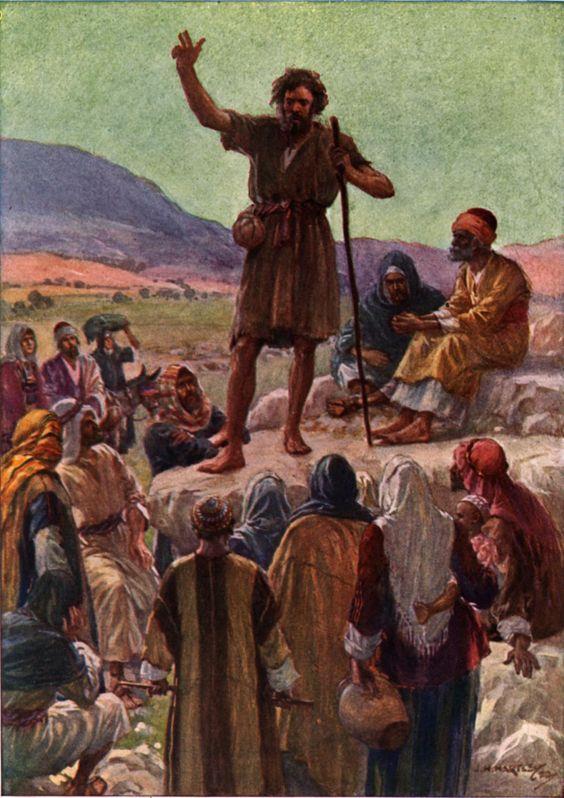 “The world is full of good people, if you can’t fine one, be one.†Mother Teresa.
“The world is full of good people, if you can’t fine one, be one.†Mother Teresa.
John the Baptist is one of the most popular prophets in the Bible. He is also one of the most unusual, different, and perhaps even, off-putting. That’s a strange combination, but it’s also very true. If I were to try to emulate him, I might find myself in a bit of trouble, and completely unemployable!
Let’s look at a couple of reasons for this. First of all, his dress and diet are unusual to say the least. Matthew’s gospel says: “Now John wore clothing of camel’s hair with a leather belt around his waist, and his food was locust and wild honey.†(Matt. 3:4) You can’t help but wonder about that. I enjoy honey on occasion, but I never combine it with locust, there are better ways to get protein into my diet. My black clothes and white collar are a bit different than most people’s, but look quite fine for my profession. I also love the long alb and chasuble I get to wear when I preside at the eucharist. After two thousand years, people have gotten used to them. No camel haired cloak for me.
But, it goes well beyond his clothing and food, it’s how John addresses his audience. He insults them! That’s right, John the Baptist puts his hearers on notice whenever he preaches to them. “You brood of vipers! Who warned you to flee from the wrath to come?†(Matt. 3:7) Isn’t it amazing that he feels quite free to say that to the throngs who come out to hear him preach? His chief sermon title is “Repent, for the kingdom of heaven has come near.†Again, he is telling his listeners that they are not right with God.
And they loved him for it. That’s very important to understand. John didn’t mince words, he spoke straight from the heart about the kingdom of heaven, and what is required of us. Matthew tells us, “Then the people of Jerusalem and all Judea were going out to him…they were baptized by him…confessing their sins.†(Matt. 3:5-6)
John’s message of judgement and repentance were well received because John’s voice was an authentic proclamation of God’s message to us.
The Rev. Steven L. Schuneman
Priest in the Episcopal Diocese of San Diego
Readings for this Sunday:
Isaiah 11:1-10 Psalm 72:1-8 Romans 15:4-13 Matthew 3:1-12
|
RETURN TO TOP
This Sunday and Beyond - November 27th
Get it in PDF form with calendar
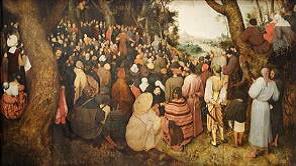 This Sunday we enter Advent, the season in which we prepare for the comings of our Lord Jesus Christ. While the season will culminate with our celebration of Jesus’ birth at Christmas – his first, historical coming – we can’t forget that there are two others: his final coming “with power and great glory†and his ongoing one. At his birth in Bethlehem, the Word of God himself enters human history, and the Advent Mass readings provide the context for that. In the Old Testament readings from the prophets we hear the message of hope in the coming Messiah and how he would be recognized. In the Gospel readings we hear John the Baptist preparing the people of that specific time, reminding them of the prophecies and calling them to repentance. In this Sunday’s gospel, Jesus himself reminds us that this call is no less urgent today, as his final coming will be at an “unexpected hour.â€
This Sunday we enter Advent, the season in which we prepare for the comings of our Lord Jesus Christ. While the season will culminate with our celebration of Jesus’ birth at Christmas – his first, historical coming – we can’t forget that there are two others: his final coming “with power and great glory†and his ongoing one. At his birth in Bethlehem, the Word of God himself enters human history, and the Advent Mass readings provide the context for that. In the Old Testament readings from the prophets we hear the message of hope in the coming Messiah and how he would be recognized. In the Gospel readings we hear John the Baptist preparing the people of that specific time, reminding them of the prophecies and calling them to repentance. In this Sunday’s gospel, Jesus himself reminds us that this call is no less urgent today, as his final coming will be at an “unexpected hour.â€
We need to be especially mindful then of all the ongoing ways that Jesus comes to us, whether through his grace, his providence, or the sacraments, and that isn’t going to happen by accident. We don’t honor Jesus or make the most of what he’s offering if we come to the sacraments unprepared. If our hearts aren’t already familiar with him, it’s difficult to even recognize Jesus’ coming through grace and the various circumstances of our lives.
Advent is a great time for the kind of intentional preparation we need to receive Jesus ever more fully into our lives. Much like New Year’s resolutions, spiritual resolutions require some reflection on our current state and the steps we can take to change it for the better. How often do we give ourselves the opportunity to encounter Jesus, whether through prayer and worship, Bible study, or service to others? And are we mostly present and reverent in these times, or often just going through the motions? Once you’ve considered those things, make specific goals, like spending fifteen minutes a day reading the gospel lesson from Mass and meditating on it, choosing a specific book of the Bible to study in more depth, or reading a particular book about the spiritual life. As Paul tells us, we’re closer to Jesus’
The Preaching of John the Baptist by Pieter Bruegel, the Elder
arrival than when we first believed – so let us with joy and urgency make the most of the present time.
Father McQueen
Readings for this Sunday:
Isaiah 2:1-5 Psalm 122 Romans 13:8-14 Matthew 24:37-44
|
RETURN TO TOP
This Sunday and Beyond - November 20th
Get it in PDF form with calendar
 Jesus Christ is King of Kings, and Lord of Lords. No earthly power can match or supplant the place of Jesus Christ in our lives. Sometimes, we need to be reminded that the heavenly Jerusalem is so much greater than anything we see on this earth. Jesus Christ is the restorer of the Kingdom of God, the deliverer of God’s grace, love and forgiveness.
Jesus Christ is King of Kings, and Lord of Lords. No earthly power can match or supplant the place of Jesus Christ in our lives. Sometimes, we need to be reminded that the heavenly Jerusalem is so much greater than anything we see on this earth. Jesus Christ is the restorer of the Kingdom of God, the deliverer of God’s grace, love and forgiveness.
That is so easy to see in his triumphant entry into Jerusalem on Palm Sunday. “Hosanna! Blessed is He who comes in the Name of the Lord!†The palm branches waving in the breeze, together with the garments carefully spread on his way, are visual cues of our understanding of his reign in our hearts. For a moment in time, it looks as though all things have come together in the one we call ‘Son of God.’
Yet, the gospel reading tells a different story. On Christ the King Sunday, we hear words, not from Palm Sunday, but from Good Friday. We are taken to the Place of the Skull, when we’d rather be standing at the entrance to the Holy City. It may seem strange at first, but on reflection, it is ‘meet and right.’ For it is here that we come to understand the full meaning of Christ the King. It is Christ on the cross, stripped, beaten, and dying, that reaches out to us in love: "Father, forgive them; for they do not know what they are doing.†We reject the One we who embraces us. How can this be?
The Church made an important decision to place the cross at the center of our faith and worship. We don’t hide it, we don’t deny it, we raise it up. When it passes before us, be bow our heads: “So that at the name of Jesus every knee should bend, in heaven and on earth and under the earth, and every tongue should confess that Jesus Christ is Lord, to the glory of God the Father,†(Phil. 2:10-11). The Risen Christ, proceeding from the Cross, brings together the images of sacrifice and exaltation, all in one moment.
Great West Window – Christ the King
All Saints’ Episcopal Church
Frederich Buechner said, “The Gospel is bad news before it is Good News. It is a speaking of the truth of the way things are.†It is sadly moving to hear these words in our gospel reading. To listen to the laughter of the crowd, the jeers of the leaders, “He saved others, let him save himself, if he is the Messiah of God, his chosen one!†(Luke 23:35). I sense the gathering darkness, even in the midday sun, as Jesus suffers for our sins. Before he gives up his spirit, he is mocked by one of the criminals that hang with him. “Save yourself and us!†(23:39). But, it is from the other condemned man who will not hear of it and implores our Lord, “Jesus, remember me when you come into your kingdom,†(23:42). And from the cross, Jesus offers a final absolution, "Truly I tell you, today you will be with me in Paradise.†(23:43).
And so, our King and Savior now draws near, as we come to see the Kingdom of God from the Cross of Christ.
Fr. Steven Schuneman, Retired Priest in the Diocese of San Diego
Readings for this Sunday:
Jeremiah 23:1-6 Psalm 46 Colossians 1:11-20 Luke 23:35-43
|
RETURN TO TOP
This Sunday and Beyond - November 13th
Get it in PDF form with calendar
 Blessed Lord, who caused all holy Scriptures to be written for our learning: Grant us so to hear them, read, mark, learn, and inwardly digest them, that we may embrace and ever hold fast the blessed hope of everlasting life, which you have given us in our Savior Jesus Christ; who lives and reigns with you and the Holy Spirit, one God, for ever and ever. Amen.
Blessed Lord, who caused all holy Scriptures to be written for our learning: Grant us so to hear them, read, mark, learn, and inwardly digest them, that we may embrace and ever hold fast the blessed hope of everlasting life, which you have given us in our Savior Jesus Christ; who lives and reigns with you and the Holy Spirit, one God, for ever and ever. Amen.
Let’s begin by giving thanks to the power of God’s Word in Holy Scriptures. There is nothing more powerful than the Word of God in the Bible. The Collect for this Sunday expresses it so well. ‘Grant us so to hear them, read, mark, learn, and inwardly digest them.’ God’s Word to us is like proper nourishment to the soul. We are fed by his Word and we are sustained by His promises. In worship, we hear and read the Word and we are admonished to mark and learn them as well. This is a call to study the Bible outside of worship, at home, in Bible classes, and in our heart. Such study helps us understand what God is saying in Scripture and invites us to see Him in the events of our daily lives.
With this in mind, 2 Thessalonians has some pretty practical advice, worthy of reflection. Apparently, some of the believers had begun to prepare for the end times a bit too early. They were living in idleness, not a tradition that came from Paul. They believed that the coming of Jesus was so near that they had stopped working altogether. Perhaps they were dependent solely on the offerings to the church, devoting themselves to prayer, but not working for their daily bread. Paul reminds them that they didn’t learn this from his example: “…with toil and labor we worked night and day, so that we might not burden any of you†(2 Thessalonians. 3:8). Paul was justly proud of his status as a hard worker. As a tent-maker, he took pride in being self-sufficient, many of the offerings he collected went to help the faithful in Jerusalem, suffering from drought.
Serving God and His mission is just as important today. We should not be idle for the work of the Gospel continues still. Jesus said, “The harvest is plentiful, but the laborers are few†(Matthew 9:37). Indeed, in the 21st Century, there is much work to be done in sharing God’s Word and the message of salvation in His Son, Jesus Christ. So many, young and old, have fallen away from the faith, often replacing the Good News with emptiness and even despair. Together, we share the essential calling to bring a message of hope to those who need to hear it. It is a blessing to serve the Lord this way.
Fr. Steven Schuneman, Retired Priest in the Diocese of San Diego
Readings for this Sunday:
Malachi 3:13-4:2a, 5-6 Psalm 98:5-10 2 Thessalonians 3:6-13 Luke 21:5-19
|
RETURN TO TOP
This Sunday and Beyond - November 6th
Get it in PDF form with calendar
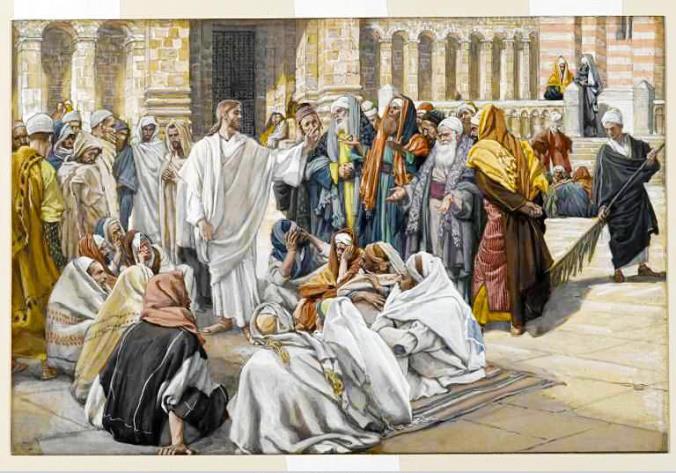 What is heaven? What is it like? Who will we see there? These are pretty common questions for many people. It falls under the category: Meaning of Life. Understanding what happens after life helps us understand our purpose and the meaning of life. Does our life matter? Is there anything of lastly value that exists after we have died? What happens when we finally close our eyes and breathe our last?
What is heaven? What is it like? Who will we see there? These are pretty common questions for many people. It falls under the category: Meaning of Life. Understanding what happens after life helps us understand our purpose and the meaning of life. Does our life matter? Is there anything of lastly value that exists after we have died? What happens when we finally close our eyes and breathe our last?
In the Gospel reading for this Sunday, Luke 20:27-38, Jesus is questioned by the Sadducees about the resurrection. The Sadducees, unlike the Pharisees, didn’t believe in the resurrection. They could find no clear teaching about it in the Scriptures, what we call the Old Testament. They saw this as an opportunity to discredit Jesus and his teaching.
They present a story about a woman whose husband died while she was still alive. Deuteronomy 25:5 states: “…the wife of the deceased shall not be married outside the family to a stranger. Her husband’s brother shall go in to her, taking her in marriage, and performing the duty of a husband’s brother to her.†The woman has an obligation to keep the family line going, raising up children for her husband. But, the Sadducees ask, what if this woman marries all seven brothers in succession, whose wife will she be in the resurrection? (Who will do the cooking, cleaning and serving?)
As you can imagine, this is a bit of a trap, and a ridiculous question. They only hope to embarrass our Lord. Jesus sees right through their hypocrisy and tells them that the age we live in is nothing like the age to come. There is no marriage or giving in marriage.
I’m reminded that there are many things I don’t know about the life to come. I wish I knew exactly what heaven looked like, or what it means to dwell in the Presence of God. I hold fast to the belief that what is called the Beatific Vision, will be beyond my comprehension.
As a Christian, I believe in the resurrection of Jesus Christ. I believe that new life is given by our Lord and Savior to those who turn to him in faith. The resurrection is essential to my faith, and a core belief. Easter is the greatest day in the Church year. It is a celebration above all celebrations because it affirms our understanding of Jesus as God’s Son and our Savior. Jesus spoke about it repeatedly, telling us, “I am the resurrection and the life.†(John 11:25) He said this to his close friend, Martha, just before he raised her brother from the dead. It is one of the truly great moments in the New Testament. A miracle that restores the faith of many.
I rejoice in the resurrection of Jesus Christ, ‘the Way, the Truth and the Life’ (John 14:6) There will be no need for questions.
Fr. Steven Schuneman, Retired Priest in the Diocese of San Diego
Readings for this Sunday:
Job 19:23-27a Psalm 17:1-8 2 Thessalonians 2:13-3:5 Luke 20:27-38
|
RETURN TO TOP
This Sunday and Beyond - October 30th
Get it in PDF form with calendar
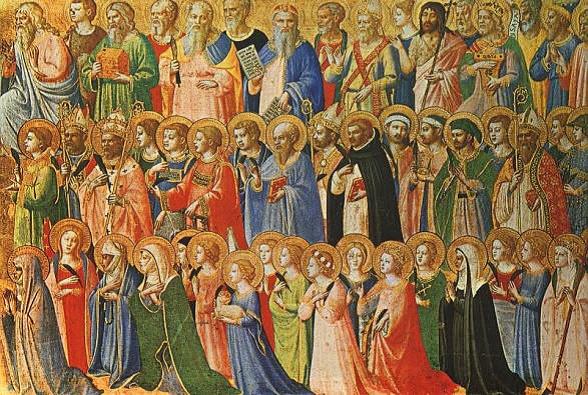 This Sunday we’ll celebrate All Saints Day, our namesake and one of the most important feasts of the Church year. It’s an especially appropriate day for baptizing and for recalling our own baptismal vows, which we’ll renew as part of the Mass. In this renewal we’ll reaffirm the basic tenets our Christian belief, as we do every Sunday, as well as how we will live those out. These include participating in the worship of the Church at Mass and regularly repenting and returning to the Lord. We also promise, with God’s help, to proclaim the gospel in word and deed, to seek and serve Christ in all persons, to strive for justice and peace, and to respect the dignity of every human being. We make these promises because in the measure that we keep them, we reveal the love of God the Father in Jesus to the world around us.
This Sunday we’ll celebrate All Saints Day, our namesake and one of the most important feasts of the Church year. It’s an especially appropriate day for baptizing and for recalling our own baptismal vows, which we’ll renew as part of the Mass. In this renewal we’ll reaffirm the basic tenets our Christian belief, as we do every Sunday, as well as how we will live those out. These include participating in the worship of the Church at Mass and regularly repenting and returning to the Lord. We also promise, with God’s help, to proclaim the gospel in word and deed, to seek and serve Christ in all persons, to strive for justice and peace, and to respect the dignity of every human being. We make these promises because in the measure that we keep them, we reveal the love of God the Father in Jesus to the world around us.
While everyone who lives this way will definitely share a certain quality, that doesn’t mean that we’re all the same, and we see that in the communion of the saints. They come from all times and places, all walks of life; some holy from the start, some experiencing profound conversions to the Faith. That’s so important because none of us can reveal God fully on our own, yet we each have the potential to reveal some facet of his glory in a way that no one else does. So when God comes into our lives, He doesn’t obliterate who we are; He’s the one who’s given us all of our gifts, talents, and personalities and He cherishes them. Instead we are like the burning bush, which was made dazzling and brilliant by the fire of God’s presence, but attracted Moses precisely because it was not consumed. At baptism we become “temples of the Holy Spirit,†and it’s deep within our hearts and souls, in the depths of who we are that the Holy Spirit resides. It’s here that the Holy Spirit is constantly working to empower us (never
forcing us!) to grow in freedom and virtue, dwell in peace, and enter more fully into the life of the Holy Trinity.
If you want to get to know God, pray for the help of the Holy Spirit to get to know who you are and who God has made you to be. None of us are perfect, but nothing about us is accidental. What are the formative events in your life? Who has shaped you? What delights you and stirs everything in you? What are the things that seem to bring some kind of heaviness whenever you encounter them?
Thinking and praying on these things allows us to meet God in the silence of our hearts, where He can show us the fullness of who we are and how beautiful we are meant to be. Then, just like the saints, by His light shining through our hearts, we can reveal who He really is to the world.
Father McQueen II
Readings for this Sunday:
Ecclesiasticus 44:1-10, 13-14 Psalm 149 Revelation 7:2-4, 9-17 Matthew 5:1-12
|
RETURN TO TOP
This Sunday and Beyond - October 23th
Get it in PDF form with calendar
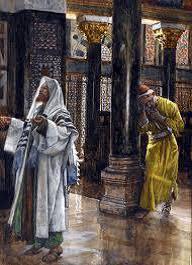 It’s hard for us to appreciate just how shocking it would have been for the people of Jesus’ time to hear this parable. On one hand, tax collectors were despised for basically using the occupying Roman forces to extort their fellow Jews; often collecting more than the law required and pocketing the extra. On the other hand, Pharisees were their undisputed religious leaders, the most respected members of the community. Yet, it’s the tax collector Jesus praises for actually making a connection with God, the purpose of prayer, and the Pharisee who’s criticized for only making a connection with himself.
It’s hard for us to appreciate just how shocking it would have been for the people of Jesus’ time to hear this parable. On one hand, tax collectors were despised for basically using the occupying Roman forces to extort their fellow Jews; often collecting more than the law required and pocketing the extra. On the other hand, Pharisees were their undisputed religious leaders, the most respected members of the community. Yet, it’s the tax collector Jesus praises for actually making a connection with God, the purpose of prayer, and the Pharisee who’s criticized for only making a connection with himself.
When we truly connect to God, we see how unworthy we are, but also how much greater God’s love and mercy is than our unworthiness. The result is not that we think less of ourselves, but that we think of ourselves less. As we’re freed from our selfishness, we’re better able to love God and do what he wants us to do, which is to reveal him to the world by loving our neighbor as he does. If we’re only connecting to ourselves, we’ll very quickly fall into self-righteousness, often without even noticing. We’ll begin to see our piety and devotion, our sacrifices, even our service to others, as the signs of our goodness; and the more we notice what we do, the more we’ll notice what others don’t.
This can be really subtle and difficult to see in ourselves, because it’s hard to gauge the quality of something until we see how well it serves its purpose, and prayer is no different. For example, I can sniff leaves, but I can’t really tell how good the tea is until I add the hot water. In the same way, I can’t really know how effective my prayer has been until I see what comes out in my interactions with the people around me. Do I reveal the universal love and mercy of the Father? Or am I quick to look down on those around me, take pleasure in criticizing others, and play
favorites? Do I reveal the suffering love of Jesus, praying for those who crucified him? Or am I impatient with those who let me down or don’t meet my expectations, and entertain vindictive thoughts at those who get on my nerves or wound me?
If we’re able to see those things in ourselves, thanks be to God – because it means that we’re connecting to him. We haven’t been blinded to our need for God’s mercy, and so we can pray like the tax collector and be confident that he has much more to offer us.
Father McQueen II
Readings for this Sunday:
Jeremiah 14:7-10, 19-22 Psalm 84:1-6 2 Timothy 4:6-8, 16-18 Luke 18:9-14
|
RETURN TO TOP
This Sunday and Beyond - October 16th
Get it in PDF form with calendar
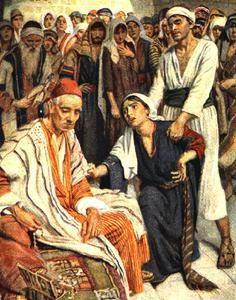 In this Sunday’s gospel lesson, Jesus gives us a parable reminding us of our need to pray always and not to lose heart. He gives the example of a widow stubbornly demanding justice from an unjust judge, who finally gives in simply to get rid of her. Of course his point is that if persistence can bring about justice through an unjust judge, we should have the utmost confidence in coming to God, who is Justice and Love itself.
Even though we know we need God’s help to meet the challenges of our lives, we don’t always have the same “holy tenacity†of that widow. We give up too easily when we can’t see anything happening and God seems silent, and the effects of this can be devastating. Jesus shows us this tragedy from God’s point of view in a rhetorical question that completes verse 8 (but for some reason is omitted from the lesson): “Nevertheless, when the Son of man comes, will he find faith on earth?â€
He’s referring to his second coming at the final judgment, and wondering aloud whether there will be anyone left who really believes in him. While this might sound like exasperation or cynicism, what we’re really seeing is Jesus baring his broken heart, and that of the Father, to us. He’s just promised that God will never abandon us, and yet he knows that some of us will give up on God. Far too many people let this experience gradually dim the light of God in their lives, and even extinguish it when a particularly desperate plea seems to have gone unanswered.
So Jesus expresses an anguished plea of his own, hoping that we might be encouraged to trust and persevere, to stick with him through thick and thin, and not let life’s difficulties wear us down. The way that we do that is to be constant in our prayer, offering everything that comes our way back to God and waiting on God’s answer. If we’re doing all the talking, we shouldn’t be surprised when we don’t hear his response. We have to be humble enough to let his will be done and quiet enough to notice when he’s trying to move us in another direction.
A very simple way to start is with 10 minutes in the morning, 5 minutes in the middle of the day, and another 10 at night. Share what’s going on in your life, and also think about what you have trouble submitting or entrusting to God’s will. Whatever you do, be sure to leave space for silence, to sit and listen with an open heart and mind. If we’re faithful in doing this, we’ll soon find that it would be harder to stop going to God than to keep coming.
In this Sunday’s gospel lesson, Jesus gives us a parable reminding us of our need to pray always and not to lose heart. He gives the example of a widow stubbornly demanding justice from an unjust judge, who finally gives in simply to get rid of her. Of course his point is that if persistence can bring about justice through an unjust judge, we should have the utmost confidence in coming to God, who is Justice and Love itself.
Even though we know we need God’s help to meet the challenges of our lives, we don’t always have the same “holy tenacity†of that widow. We give up too easily when we can’t see anything happening and God seems silent, and the effects of this can be devastating. Jesus shows us this tragedy from God’s point of view in a rhetorical question that completes verse 8 (but for some reason is omitted from the lesson): “Nevertheless, when the Son of man comes, will he find faith on earth?â€
He’s referring to his second coming at the final judgment, and wondering aloud whether there will be anyone left who really believes in him. While this might sound like exasperation or cynicism, what we’re really seeing is Jesus baring his broken heart, and that of the Father, to us. He’s just promised that God will never abandon us, and yet he knows that some of us will give up on God. Far too many people let this experience gradually dim the light of God in their lives, and even extinguish it when a particularly desperate plea seems to have gone unanswered.
So Jesus expresses an anguished plea of his own, hoping that we might be encouraged to trust and persevere, to stick with him through thick and thin, and not let life’s difficulties wear us down. The way that we do that is to be constant in our prayer, offering everything that comes our way back to God and waiting on God’s answer. If we’re doing all the talking, we shouldn’t be surprised when we don’t hear his response. We have to be humble enough to let his will be done and quiet enough to notice when he’s trying to move us in another direction.
A very simple way to start is with 10 minutes in the morning, 5 minutes in the middle of the day, and another 10 at night. Share what’s going on in your life, and also think about what you have trouble submitting or entrusting to God’s will. Whatever you do, be sure to leave space for silence, to sit and listen with an open heart and mind. If we’re faithful in doing this, we’ll soon find that it would be harder to stop going to God than to keep coming.
Father McQueen II
Readings for this Sunday:
Genesis 32:3-8, 22-30 Psalm 121 2 Timothy 3:14-4:5 Luke 18:1-8a
|
RETURN TO TOP
This Sunday and Beyond - October 9th
Get it in PDF form with calendar
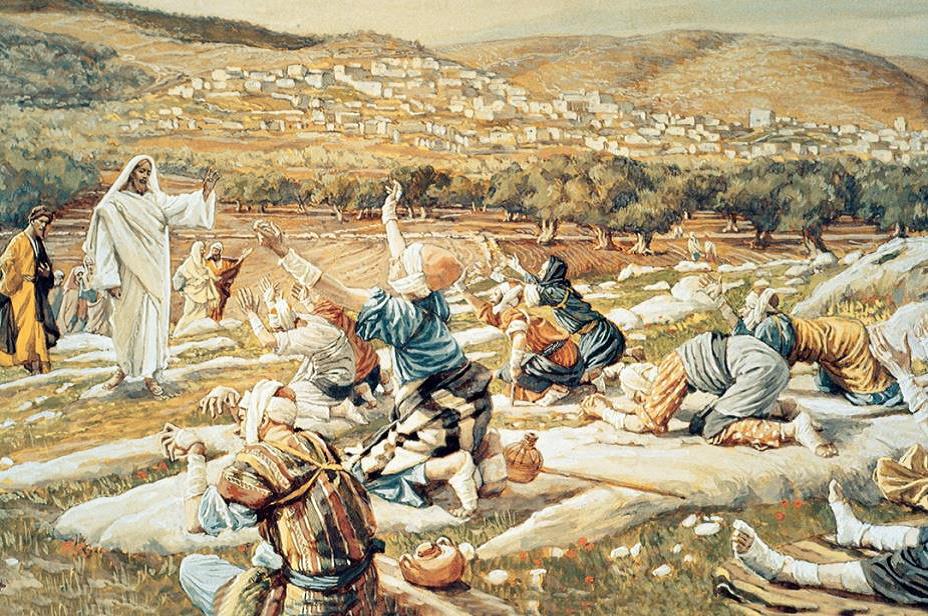 Gratitude and grace are two words and themes that we see in the readings today. They are important words as we come to understand our journey of faith in this life. If we hold them together, we can better come to appreciate the meaning of life and what is essential for us.
Gratitude and grace are two words and themes that we see in the readings today. They are important words as we come to understand our journey of faith in this life. If we hold them together, we can better come to appreciate the meaning of life and what is essential for us.
We find the word ‘grace’ in the Collect of the Day: ‘Lord, we pray that your grace may always precede and follow us, that we may continually be given to good works.’ Perhaps the first thing we think of is the grace we say at meals, but the meaning of grace is so much deeper than that. We can try to comprehend it, but it’s definition will always allude us.
Grace is the Love of God, freely given, unmerited and undeserved that we experience throughout our life. It has been said that everything is grace, a gift from God who loved us into being. To live a grace filled life, is to appreciate the presence of God in all things, even the hardest moments of our life. Grace is our salvation, faith, and healing.
Like the ten lepers that Jesus encounters in the gospel reading today. It is hard to find grace in their leprosy, a terrible disease that destroys body and soul. But, their encounter with Jesus is one of grace and healing. They call to Jesus, “Have mercy on us!†Most people would have nothing to do with lepers, they would not go near them, they would send them away, and quickly. Jesus sends them away, but he sends them healed of their disease. He sends them to the priests, who alone can declare them clean again. For the lepers, grace poured out like a waterfall, cleansing them from their disease. A miraculous sign of God’s grace and love. They must have jumped for joy and run to show their families and friends.
The gospel tells us that one man turned back. One man, when he saw that he was healed, turned back to Jesus, praising God for all that He had done. He fell at the feet of the Master, giving thanks for the grace of God, and he was a Samaritan. He was an outcast living among outcasts. Jesus cannot help but notice that ten were cleansed but only one returned to give thanks. How can that be?
I can imagine this quite easily. Grace, like the air we breathe, surrounds me every day. It always precedes and follows me. Wherever I go, I can know that grace has been there before me. I know that grace will follow me along every path of life, and I forget every day. I forget to give thanks constantly for God’s grace and presence. I’m too busy, too preoccupied, to rush back to Jesus and give thanks to His Name. I may take a moment, but the moment passes too quickly.
O God, help us to receive with joy and gratitude the gracious life and love that you bestow upon us each and every day. Amen.
Fr. Steven Schuneman, Retired Priest in the Diocese of San Diego
Readings for this Sunday:
Ruth 1:1-19a Psalm 113 2 Timothy 2:8-15 Luke 17:11-19
|
RETURN TO TOP
This Sunday and Beyond - October 2nd
Get it in PDF form with calendar
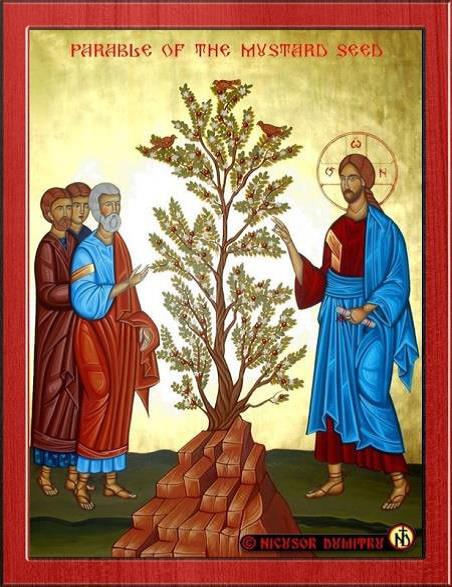 When looking at something beautiful, I’ve found that it is often helpful to take a couple of steps back, just to see the whole picture. Then, I am filled with amazement and even greater understanding. That is true of reading the Bible, as well. Sometimes, it makes sense to step back a few verses and see the context of the reading for a deeper understanding.
When looking at something beautiful, I’ve found that it is often helpful to take a couple of steps back, just to see the whole picture. Then, I am filled with amazement and even greater understanding. That is true of reading the Bible, as well. Sometimes, it makes sense to step back a few verses and see the context of the reading for a deeper understanding.
The central message of the reading today comes from the disciples’ plea: ‘Increase our faith!’ This is a request that I can understand completely. I often feel the need for greater faith. Like everyone else, I struggle with the daily questions of faith seeking understanding. Why is this happening? What does it mean? Where is God in my life right now? I imagine we all have questions like this
So, in today’s gospel reading, let’s take a step back and look at the verses that come just before this. Jesus is telling his disciples that they must forgive their brother or sister over and over. It’s a familiar passage, and it ends by telling them to forgive someone even if they sin against them seven times in a day. Seven times!
No wonder the disciples say, ‘Increase our faith!’ Forgiveness is one of the hardest things for us to do. When someone sins against us, it comes with hurt, real pain. A betrayal of a friend is so much greater than a sin that comes from someone we barely know. It is easier to let that go. It is easier to imagine that we can forgive than to forget. We say that we forgive, but we may still hold it in our hearts. Indeed, increase our faith, and help us to forgive. It is like a millstone that hangs around our neck, pulling us down, further and further.
Jesus tells us something quite amazing. He says, that if we had the faith of a mustard seed, we could uproot a mulberry tree, or move mountains! Such a little seed that grows into a mighty bush. I think, ‘Yes, I have that! I have that much faith somewhere deep down inside me. I have the ability to reach into my heart and find that faith. It is enough for me to be able to forgive my brother or sister, my friend, my neighbor. It is enough faith for me to be able to cut the chord of the millstone that hangs so tightly around my neck and pulls me down.
I’m grateful to know that God is with me in my struggles. That He wants to help me when I need my faith most. I can hold the mustard seed in the palm of my hand. I can reach out my hands and embrace another in a true sign of forgiveness and grace.
Fr. Steven Schuneman, Retired Priest in the Diocese of San Diego
Readings for this Sunday:
Habakkuk 1:1-6, 12-13; 2:1-4 Psalm 37:3-10 2 Timothy 1:6-14 Luke 17:5-10
|
RETURN TO TOP
This Sunday and Beyond - September 25th
Get it in PDF form with calendar
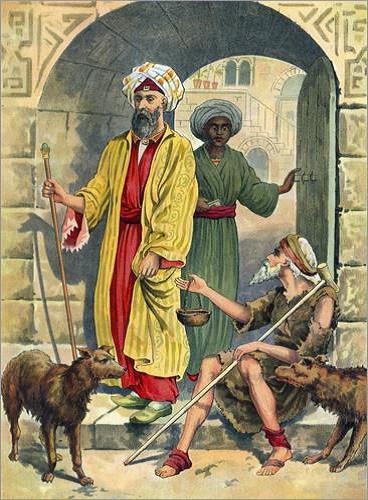 In the gospel lesson for this Sunday, Jesus’ parable makes it very clear that the way we live our lives carries eternal significance. In it we see a stark contrast between a man who is fantastically wealthy in life and tormented in eternity, and a man named Lazarus, who lives his life in utter misery but finds eternal comfort. Seeing this, the rich man cries out for mercy, but Abraham tells him, “Son, remember that you in your lifetime received your good things, and Lazarus in like manner evil things; but now he is comforted here, and you are in anguish.â€
In the gospel lesson for this Sunday, Jesus’ parable makes it very clear that the way we live our lives carries eternal significance. In it we see a stark contrast between a man who is fantastically wealthy in life and tormented in eternity, and a man named Lazarus, who lives his life in utter misery but finds eternal comfort. Seeing this, the rich man cries out for mercy, but Abraham tells him, “Son, remember that you in your lifetime received your good things, and Lazarus in like manner evil things; but now he is comforted here, and you are in anguish.â€
We spend our whole lives here on earth becoming who we will be in eternity. The choices we make, what we do with the blessings we receive, how we respond to suffering, and so on, all create deeply-ingrained patterns of thought and behavior. So while we know that we’ll only be completely free of our sins and imperfections after death, it seems unlikely that a lifetime of selfish choices will somehow ultimately prepare us to be totally selfless and choose to serve God for all eternity. Just look at the parable: the rich man had the picture of absolute human misery sitting right outside his door; a man so poor that even the smallest act of kindness would have gone a long way. Yet it seems that his heart was so hard that he never took the slightest opportunity to show love and mercy. Even when their roles are reversed, and it’s Lazarus in glory, the rich man’s instinct is still to have Lazarus serve him!
This kind of contrast shouldn’t be at all unfamiliar to us as San Diegans; we’re presented every day with the same choices and opportunities to show love and mercy. If we’re “rich,†that is, if we have something to share, we would do well to listen to Paul’s words to Timothy from Sunday’s second lesson and “do good, be rich in good deeds,
generous and ready to share.†The beauty is that we can all do this, even if we’re poor in material things. Out of his love for us and our dignity, God always gives us something to share, even if it’s just a smile, a kind word, or the smallest act of kindness. If we spend our lives looking for what we can offer to others, no matter our circumstances, we can, as Paul says, lay a good foundation for our futures and take hold of the life that is life indeed.
Fr. McQueen +
Readings for this Sunday:
Amos 6:1-7 Psalm 146:4-9 1 Timothy 6:11-19 Luke 16:19-31
|
RETURN TO TOP
This Sunday and Beyond - September 18th
Get it in PDF form with calendar
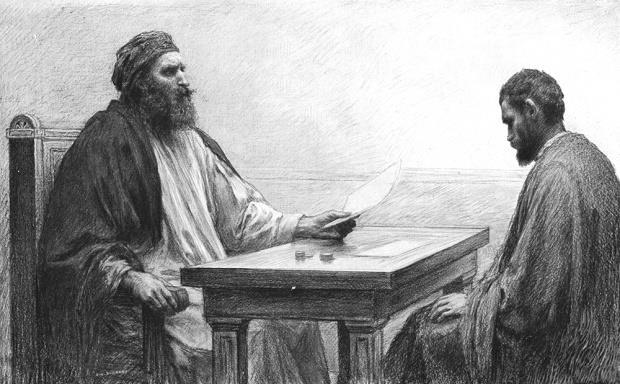 The gospel lesson for this Sunday contains a verse (Luke 16:10) that I purposefully call to mind every day: “He who is faithful in a very little is faithful also in much; and whoever is dishonest in a very little is dishonest also in much.†It’s an important admonition not to devalue any of the day’s tasks and interactions, or think that they’re somehow separate from our relationship with God. While I can appreciate how this might sound like an impossible burden, for me, being reminded that even the smallest of things matter actually lifts that weight off my shoulders.
The gospel lesson for this Sunday contains a verse (Luke 16:10) that I purposefully call to mind every day: “He who is faithful in a very little is faithful also in much; and whoever is dishonest in a very little is dishonest also in much.†It’s an important admonition not to devalue any of the day’s tasks and interactions, or think that they’re somehow separate from our relationship with God. While I can appreciate how this might sound like an impossible burden, for me, being reminded that even the smallest of things matter actually lifts that weight off my shoulders.
I find this so encouraging because it means that my whole life is of the utmost importance to God. What he wants most is the one thing I can give him that he can’t get for himself – my heart. He doesn’t want just the best parts, and he’s not interested in waiting for what’s still under construction. God wants the whole thing, right now, “as is,†so that he can show us that not even one moment of our lives has been left empty or meaningless. When we faithfully invite him in, nothing is so little that God can’t use it to bring us closer, which is especially comforting when it seems like being “faithful in a very little†is the best I can do.
Being faithful in a little and in much can happen at the same time when we do whatever we can with what we have. When we do that, God celebrates with great joy even what seem like tiny things or baby steps to us, but we have to be single-minded about it. Jesus warns that we can’t serve two masters, but will eventually love one and hate the other (see Luke 16:13). Whenever we hold something back or set limits on what God can ask of us, we’re setting the stage for that very thing.
Much of our growth in the spiritual life then is becoming aware of those limits and asking God for help in removing them. If that seems impossible, we can start by doing what we can with what we have. Am I praying, meditating, and reading the Bible every day? Do I attend Mass as often as I can? Have I resolved not to sin at all (even in the smallest way!), or to do anything that might offend or displease God? Do I actively seek to love and serve those around me? By inviting God more fully into the places he’s already welcome, we can keep growing in love and learn to share our burdens, and so allow him to make much of even our little faith.
Fr. McQueen +
Readings for this Sunday:
Amos 8:4-12 Psalm 138 1 Timothy 2:1-8 Luke 16:1-13
|
RETURN TO TOP
This Sunday and Beyond - September 11th
Get it in PDF form with calendar
 Because God has made us in his own image, the characteristics and dynamics of human life often provide a vocabulary for helping us learn something about God. However, we also have to be careful not to work backwards and assign God the same imperfections we have as fallen creatures, as we see the Pharisees and scribes doing in today’s gospel lesson. They have no trouble whatsoever writing off the tax collectors and sinners, but in his parables Jesus shows us what God really thinks of these “lost causes.â€
Because God has made us in his own image, the characteristics and dynamics of human life often provide a vocabulary for helping us learn something about God. However, we also have to be careful not to work backwards and assign God the same imperfections we have as fallen creatures, as we see the Pharisees and scribes doing in today’s gospel lesson. They have no trouble whatsoever writing off the tax collectors and sinners, but in his parables Jesus shows us what God really thinks of these “lost causes.â€
God has created each of us to receive his love and reveal it to the world in a particular way through our own unique gifts and experiences. This is God’s deepest desire for us, and so Jesus shows us in his parables that when our sin gets in the way, God doesn’t abandon us in anger, but chases after us. When we’re lost, there is nothing God won’t go through, there is no place he won’t search to find us, even if it seems ridiculous. No one in their right mind would go off looking for one sheep and leave the other ninety-nine at risk or turn the house upside down looking for a single coin. And if that’s not enough of a waste of time and energy, then there’s the invitation to rejoice and celebrate! A big part of what makes these parables beautiful is how far beyond practical they are, and the parable of the prodigal son which follows right after is borderline outrageous!
It’s in this impractical and outrageous love of God that we find some consolation, knowing that we can never be too far gone. Then, after we’ve been found and restored to his love, God rejoices, but he’s not satisfied. Jesus tells us that even the hairs on our heads are numbered to remind us that nothing about our lives is small or insignificant. God wants our lives to be full, so he’s not satisfied with leaving any corner of them untouched. So don’t be too quick to write off some part of your life, something you think can never change. Nothing about you is a lost cause and nothing in your life is too small for God to make it something great.
Fr. McQueen +
Readings for this Sunday:
Exodus 32:1, 7-14 Psalm 51:1-11 1 Timothy 1:12-17 Luke 15:1-10
|
RETURN TO TOP
This Sunday and Beyond - September 4th
Get it in PDF form with calendar
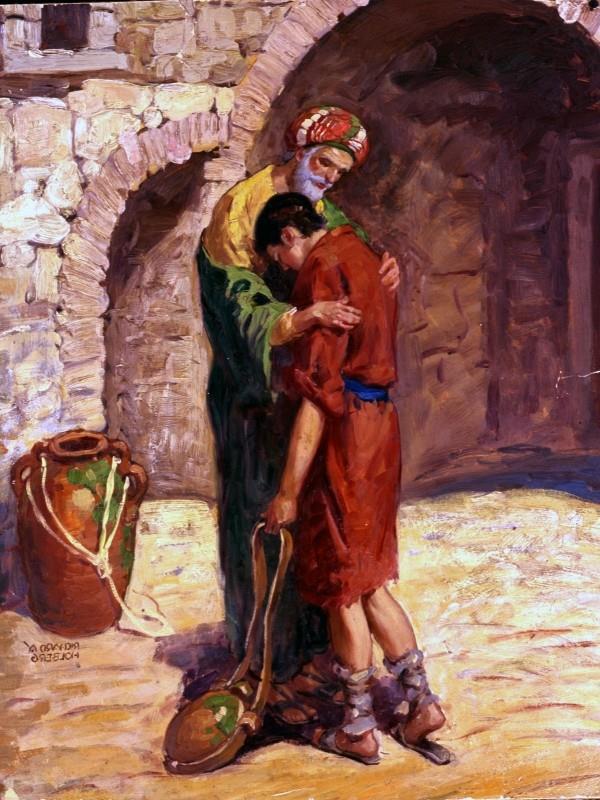 The second lesson for this Sunday is Paul’s letter to Philemon, where we have an example of the radical difference faith in Jesus makes in our lives and in the world. The subject of the letter is a man named Onesimus, a slave who had run away from his master Philemon, a friend and convert of Paul’s. He had made his way to Rome, where, under Paul’s care, he too had become a Christian. Paul is now sending Onesimus back with this note, asking Philemon to forgive him and accept him back not as a slave, but as a brother in Christ. While the world would have seen this as unthinkable, Paul has every expectation that his request will be granted because he’s asking Philemon to see this through the eyes of Jesus.
The second lesson for this Sunday is Paul’s letter to Philemon, where we have an example of the radical difference faith in Jesus makes in our lives and in the world. The subject of the letter is a man named Onesimus, a slave who had run away from his master Philemon, a friend and convert of Paul’s. He had made his way to Rome, where, under Paul’s care, he too had become a Christian. Paul is now sending Onesimus back with this note, asking Philemon to forgive him and accept him back not as a slave, but as a brother in Christ. While the world would have seen this as unthinkable, Paul has every expectation that his request will be granted because he’s asking Philemon to see this through the eyes of Jesus.
Paul alludes to this when he prays that Philemon’s sharing of the faith may become effective when he perceives all the good that we may do for Christ. The world tends to approach relationships from the perspective of justice, that is, the parties fulfilling their duties and obligations and having their rights and interests protected, and that’s good. However, it’s not all the good that we can do for Jesus, which Paul demonstrates when, instead of commanding Philemon to do his Christian duty, he makes his appeal on the basis of love. In this literal circumstance we see the spiritual reality that when we show mercy, allowing our love to go beyond justice, relationships are transformed. Debts are paid, slavery becomes freedom, and bondage becomes brotherhood.
Also, it’s critical to see that Paul doesn’t impose this on Philemon, but invites him to choose the greatest good, and offers to pay the debt himself, if that helps. This is what Jesus has done for us, paying our eternal debt so that we can be generous rather than stingy with our brothers and sisters. So looking at our lives with the eyes of Jesus, are there any places where we’re holding onto the idea of justice when what’s really needed is mercy? We need to look for opportunities to make the same invitation, offering more than what’s owed or expected, whether that means forgiveness and mercy or just a greater
Philemon and Onesimus
love. That’s what it means to do all the good we can for Christ and it’s what will make our faith most effective when we share it.
Fr. McQueen +
Readings for this Sunday:
Deuteronomy 30:15-20 Psalm 1 Philemon 1-20 Luke 14:25-33
|
RETURN TO TOP
This Sunday and Beyond - August 28th
Get it in PDF form with calendar
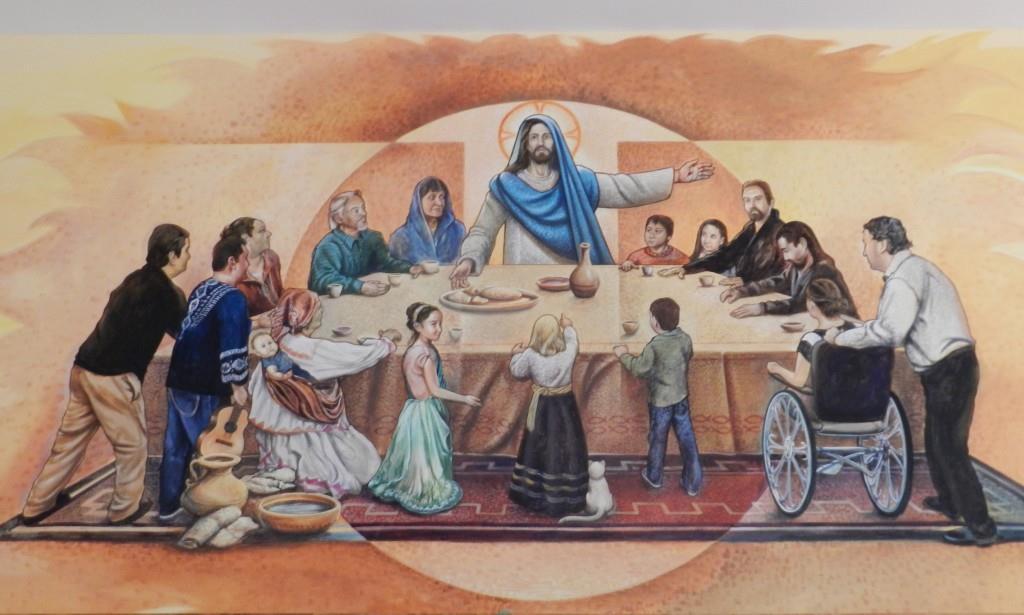 In his parable about finding a seat at a wedding banquet, Jesus is teaching us about more than prudence or good manners. By directing us to choose the lowest place, Jesus is showing us the way God’s kingdom always comes. Throughout the Old Testament we see God choosing to work through the refugee, the barren women, and the younger sons, and the New Testament is no different. When God himself enters the world, it’s not as a pillar of cloud or fire, a majestic, celestial being, or even an earthly prince. He comes instead as the son of a poor couple living in the country, and only after asking the young virgin’s permission. Jesus was rejected by the rulers and authorities and even fled from earthly power when it was offered to him. At every turn he chose to reveal God’s glory to the poor, sick, weak, and marginalized because the way of the kingdom is the way of love.
In his parable about finding a seat at a wedding banquet, Jesus is teaching us about more than prudence or good manners. By directing us to choose the lowest place, Jesus is showing us the way God’s kingdom always comes. Throughout the Old Testament we see God choosing to work through the refugee, the barren women, and the younger sons, and the New Testament is no different. When God himself enters the world, it’s not as a pillar of cloud or fire, a majestic, celestial being, or even an earthly prince. He comes instead as the son of a poor couple living in the country, and only after asking the young virgin’s permission. Jesus was rejected by the rulers and authorities and even fled from earthly power when it was offered to him. At every turn he chose to reveal God’s glory to the poor, sick, weak, and marginalized because the way of the kingdom is the way of love.
One of the most beautiful images I’ve heard used to describe the way God loves us is Him pouring Himself out like water. More than superficial fondness or sentiment, He touches everything, not stopping at what’s highest or best, but cascading down to the lowest place. God rushes to settle where He’s most needed, but often most unwelcome. This is the fullness of what it means to love – to will the good of the other, no matter what it costs or how it’s received.
In his parable, Jesus is teaching how to grow in humility because pride always blocks love. It turns us inward, so that we can’t will someone else’s good if it’s not at least as good
for us. If it puffs us up, everything has to glorify us, so that even our service to others has to be great and notable. If pride deflates us to less than we really are, we shrink back from God’s call and blessings, believing that we’re incapable or unworthy. Humility frees us from this self-absorption so that we can love as God loves, without any self-interest. If we’re trying to lower ourselves to lift up others, nothing will be beneath us. If we know that God’s grace is sufficient for us and that His power is made perfect in our weakness (see 2 Corinthians 12:9), no task will be too big for us. When we join our wills to God’s and share His delights and desires, we’ll begin to experience the eternal celebration here on earth, and our lives will be an invitation for everyone around us to take their seat at the table.
Fr. McQueen +
Readings for this Sunday:
Ecclesiasticus 10:12-18 Psalm 112 Hebrews 13:1-8 Luke 14:1, 7-14
|
RETURN TO TOP
This Sunday and Beyond - August 21st
Get it in PDF form with calendar
 If the references to God’s coming in judgment in Sunday’s passages from Isaiah and the letter to the Hebrews have us squirming, the gospel lesson doesn’t let us off the hook. Whether we allow ourselves to dwell on it or not, when the man asks, “Will only a few be saved,†he’s expressing the deepest concern of our hearts as well. For Jesus to respond “Strive to enter by the narrow door,†because not everyone who thinks they ought to be saved will be can (and should!) leave us at least a little unsettled, wondering what went wrong for them.
If the references to God’s coming in judgment in Sunday’s passages from Isaiah and the letter to the Hebrews have us squirming, the gospel lesson doesn’t let us off the hook. Whether we allow ourselves to dwell on it or not, when the man asks, “Will only a few be saved,†he’s expressing the deepest concern of our hearts as well. For Jesus to respond “Strive to enter by the narrow door,†because not everyone who thinks they ought to be saved will be can (and should!) leave us at least a little unsettled, wondering what went wrong for them.
Their problem was that they didn’t have what the Bible calls “fear of the Lord.†This doesn’t mean being terrorized by what one of my seminary professors called, “the Gonna-getcha God,†that is, the imperious judge waiting to pour out his wrath on our every misstep. We might think of it instead as realizing that we were made for an exclusive relationship with someone we can’t control or define and that when we try to find fulfillment outside of that relationship we do ourselves an eternally grave injustice. The fear of the Lord is “the beginning of wisdom†(Ps 111:10; Sir 1:14) because it puts everything in our lives in order. Wisdom ends in love because as we’re motivated to pursue this relationship instead of settling for something that seems easier, we come to know and experience that God is Love (cf. 1 John 4).
Isaiah lays out the pattern for what happens without the fear of the Lord at the beginning of today’s passage. He’s basically saying, “You’ve made a deal with the devil to protect you from suffering and judgment, but that contract is a lie and your shelter’s too flimsy.†Our flimsy shelters are things like comfort, security, success, or being liked, which don’t even stand up to the sufferings of this world. In his mercy God allows suffering to touch and even sweep away those things, showing us that they can’t deliver what they promised.
The lies that we don't need to be that concerned about what happens when we die right now or that we just need to live a good life are even more dangerous. They take the edge off our anxiety now, and the longer we listen to them, the number we get to God poking and prodding our hearts. So Jesus says, “Strive to enter by the narrow door,†urgently
warning us not to settle for anything less than God himself and to set the highest standards for loving him. And even though learning to properly fear the Lord will be difficult, we can do it with boldness and confidence, not squirming or shrinking back, because, as St. Paul points out, “If God is for us, who can be against us?†(Rom 8:31)
Fr. McQueen +
Readings for this Sunday:
Isaiah 28:14-22 Psalm 46 Hebrews 12:18-19, 22-29 Luke 13:22-30
|
RETURN TO TOP
This Sunday and Beyond - August 14th
Get it in PDF form with calendar
Feast of Saint Mary the Virgin
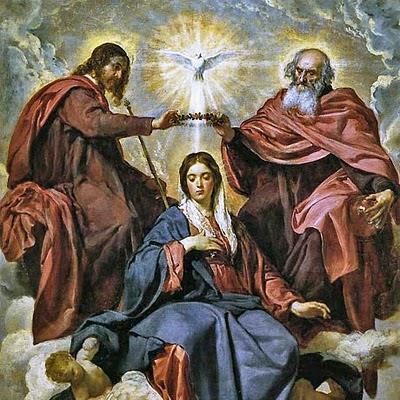 I’m not a morning person. While daily Bible reading and morning prayer is the first scheduled activity on my calendar every day, I’d be just as happy to do this at 10 or 11 AM instead of the usual 7. I trust God understands my heart is his even if my eyes struggle to focus on the words before me. I hope that my offering of the first minutes of my day not only gets the day off to the best start, but represents an acceptable sacrifice as best as I’m able to offer at that time.
I have to confess that if an angel ever appeared to me during my morning prayer time, my response to any message delivered would fall far short of the beautiful Magnificat of Mary as recorded in the Gospel of Luke. I’d be much more likely to beg off playing any role in God’s plan of universal salvation with excuses of inadequacy rather than offering soaring and unreserved praise. Maybe one reason my Creator hasn’t blessed me with an angelic visitation yet is because He knows me so well.
But my regular religious practice does help me encounter the Lord in ways in which I’m frequently surprised, whether in the words of Holy Scripture, through my own my feeble prayers, or when receiving the Sacraments. If I feel him ask me to serve him in some way I hadn’t previously considered, I draw comfort from my confidence that whenever God speaks to us, it is in a manner particularly suited for us to offer willing assent. For this reason, the words of Mary not only impress me, but they also inspire me.
I’m also inspired by the recognition that when God upends human expectations, as he does so frequently throughout the Bible, the men and women who cooperate with his will are blessed in ways they probably couldn’t imagine before their encounter with Him. So, just as the devout Jewish girl probably had no idea what it would mean to accept the call to be the human mother of God’s incarnate Son, when I follow the Holy Spirit’s prompting, even with a halting and hesitant yes, my first step in obedience not only takes my faith in new and wondrous directions, it might even, by the grace of God, change the world. And that’s worth getting up for at any hour.
Rick Ochocki, member of All Saints’ Parish
I’m not a morning person. While daily Bible reading and morning prayer is the first scheduled activity on my calendar every day, I’d be just as happy to do this at 10 or 11 AM instead of the usual 7. I trust God understands my heart is his even if my eyes struggle to focus on the words before me. I hope that my offering of the first minutes of my day not only gets the day off to the best start, but represents an acceptable sacrifice as best as I’m able to offer at that time.
I have to confess that if an angel ever appeared to me during my morning prayer time, my response to any message delivered would fall far short of the beautiful Magnificat of Mary as recorded in the Gospel of Luke. I’d be much more likely to beg off playing any role in God’s plan of universal salvation with excuses of inadequacy rather than offering soaring and unreserved praise. Maybe one reason my Creator hasn’t blessed me with an angelic visitation yet is because He knows me so well.
But my regular religious practice does help me encounter the Lord in ways in which I’m frequently surprised, whether in the words of Holy Scripture, through my own my feeble prayers, or when receiving the Sacraments. If I feel him ask me to serve him in some way I hadn’t previously considered, I draw comfort from my confidence that whenever God speaks to us, it is in a manner particularly suited for us to offer willing assent. For this reason, the words of Mary not only impress me, but they also inspire me.
I’m also inspired by the recognition that when God upends human expectations, as he does so frequently throughout the Bible, the men and women who cooperate with his will are blessed in ways they probably couldn’t imagine before their encounter with Him. So, just as the devout Jewish girl probably had no idea what it would mean to accept the call to be the human mother of God’s incarnate Son, when I follow the Holy Spirit’s prompting, even with a halting and hesitant yes, my first step in obedience not only takes my faith in new and wondrous directions, it might even, by the grace of God, change the world. And that’s worth getting up for at any hour.
Rick Ochocki, member of All Saints’ Parish
Rick Ochocki
member of All Saints’ Parish
Readings for this Sunday:
Isaiah 61:10-11 Psalm 34:1-9, Galatians 4:4-7, Luke 1:46-55
|
RETURN TO TOP
This Sunday and Beyond - August 7th
Get it in PDF form with calendar
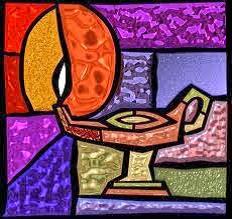 "Be dressed for action and have your lamps lit; be like those who are waiting for their master to return from the wedding banquet, so that they may open the door for him as soon as he comes and knocks.†(Luke 12:35-36)
"Be dressed for action and have your lamps lit; be like those who are waiting for their master to return from the wedding banquet, so that they may open the door for him as soon as he comes and knocks.†(Luke 12:35-36)
This has happened to me many times. It’s about 9:00 in the evening and the power goes out. Poof! Whatever I’ve been doing, unless I’m sound asleep, I have to stop and get some light. I get up and make a serious search for a flashlight. For some reason, I never remember where I keep them. Finally, I find them in the last and unlikeliest place I look. However, when I turn it on, there’s only the dimmest of lights awaiting me. I forgot to get new batteries. In the dark, I make a mental list to go to Walgreens.
I imagine that something like this has happened to you. If you fail to plan, you plan to fail. In today’s Gospel, Jesus warns the disciples to be ready, watchful and prepared. Keep you lamps lit! Jesus is like the bridegroom who comes at an unexpected hour. He is talking about the end times, and his triumphant return in glory. I want to be prepared. I want to live in preparation. That’s an excellent understanding of how to live in Christ. Don’t wait until the last minute of your life to make things right with God. Live as if Christ walked with you on the road, because indeed he does! We are all like the disciples on the road to Emmaus after the resurrection. Discovering that we have been in the presence of our Lord all along.
Jesus said to his disciples, "Do not be afraid, little flock, for it is your Father's good pleasure to give you the kingdom.†Jesus wants us to enter into the kingdom of God. He wants to draw us close like a hen draws its chicks around her to keep them safe. There are a great many things that may frighten us in this life. There are many confusing signs along the path. Which way should I go? Yogi Berra famously said, “When you come to a fork in the road, take it.†But, this leaves us wondering: Which path do I take? What will happen if I make the wrong choice?
That is where prayer and deep reflection comes in. Which path seems to lead to light? Which path leads you closer not only to your goals, but to the Heavenly Father. Finally, trust in the Lord. For no matter what best path you choose, God will walk with you, be your light, and lead you Home.
Fr. Steven Schuneman,
Retired Priest in the Diocese of San Diego
Readings for this Sunday:
Genesis 15:1-6 Psalm 33:12-15, 18-22 Hebrew 11:1-3, 8-16 Luke 12:32-40
|
RETURN TO TOP
This Sunday and Beyond - July 31st
Get it in PDF form with calendar
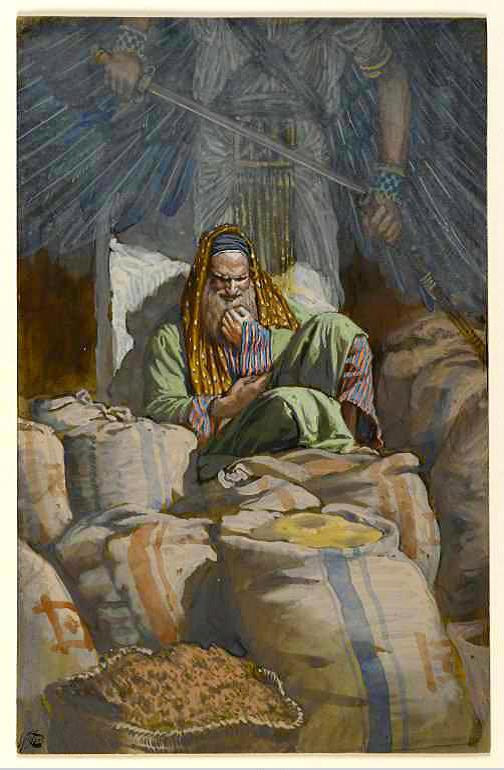 Whenever I read today’s Gospel I am struck by the question that someone asks Jesus, "Teacher, tell my brother to divide the family inheritance with me.†(Luke 12:13) I can’t imagine asking Jesus a question about inheritance or family matters. Jesus’ time on earth is so special and precious to us, that it seems wrong to ask him this question. I fully understand when people ask about eternal life, one of the commandments or even question him about the Sabbath day. These are spiritual or religious questions that were important then as they are important today. But, it was common to ask a rabbi to serve as arbitrator in family disputes. As a priest, I’ve certainly been asked to help smooth things over between family and friends, and I’ve tried my best to do right in these situations. But, I’m glad no one has ever asked me this kind of question.
Whenever I read today’s Gospel I am struck by the question that someone asks Jesus, "Teacher, tell my brother to divide the family inheritance with me.†(Luke 12:13) I can’t imagine asking Jesus a question about inheritance or family matters. Jesus’ time on earth is so special and precious to us, that it seems wrong to ask him this question. I fully understand when people ask about eternal life, one of the commandments or even question him about the Sabbath day. These are spiritual or religious questions that were important then as they are important today. But, it was common to ask a rabbi to serve as arbitrator in family disputes. As a priest, I’ve certainly been asked to help smooth things over between family and friends, and I’ve tried my best to do right in these situations. But, I’m glad no one has ever asked me this kind of question.
“Set your minds on things that are above, not on things that are on earth,†(Colossians 3:2) The epistle today reminds us that we ought to focus on heavenly things and not earthly ones. We are to be spiritual people, who are, still grounded in earthly things. It’s hard to get away from it. It has been said of a pastor, “He’s so spiritual that he’s no earthly good.†This is not a compliment. Head in the clouds, some pastors may have lost all touch with the things that matter to their parishioners. They may be able to discuss heaven and hell, but unable to help someone deal with the matters that stand before them every day.
I am, by no means, immune to these problems. I’ve embarrassed myself by asking for a parking place as if I were my fervent prayer. I don’t think God will make a Ford Focus disappear so that I can park in its spot, but I pray as though that might just happen. I’m grateful for the parable of the rich man who puts everything into a barn, only to find that his great storehouses will little matter to a man whose future has come to an end. “The things you have prepared, whose will they be?†(Luke 12:20). When I am gone, what lasting memory will I leave?
Jesus reminds us of the foolishness of excessive wealth and the wisdom that comes from generosity to others and to God. The Gospel leads us to reflect on what it means to be generous to God. That is a question worth considering. For when I am generous to God, I am the richer for it.
Fr. Steven Schuneman,
Retired Priest in the Diocese of San Diego
Readings for this Sunday:
Ecclesiastes 1:12-14, 2:18-23 Psalm 49:1-11 Colossians 3:5-17 Luke 12:13-21
|
RETURN TO TOP
This Sunday and Beyond - July 24th
Get it in PDF form with calendar
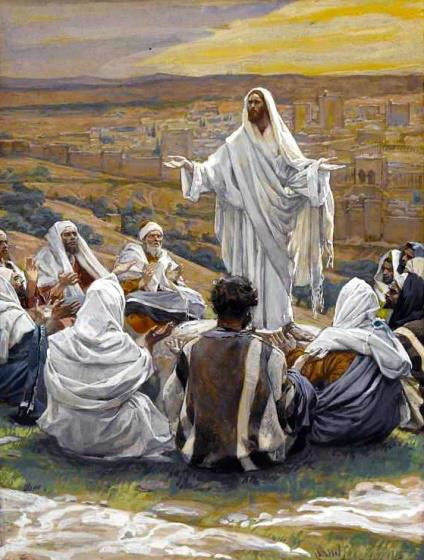 When the disciples ask Jesus to teach them to pray, how does he respond? He starts with a specific prayer, but of course the “Our Father†is not a magic formula for getting what we want. Instead, what Jesus is showing us is that prayer is much more about learning to want what we get.
When the disciples ask Jesus to teach them to pray, how does he respond? He starts with a specific prayer, but of course the “Our Father†is not a magic formula for getting what we want. Instead, what Jesus is showing us is that prayer is much more about learning to want what we get.
Jesus begins by reminding us that God is our Father and encouraging us to bring all our needs, cares, and concerns to him. He then assures us that God hears and answers our prayers with the image of the man asking his friend for bread late in the evening. Surely if even that rude man’s request was granted with the imperfect motivation to get rid of him, we can know that God, in his perfect love, always generously responds to our needs.
But then, how can Jesus say that God always hears and answers our prayers, when we don’t always get what we pray for? Because God is our heavenly Father who always gives good gifts to his children. Jesus points out that when hungry children ask for fish and eggs, we don’t turn around and give them snakes and scorpions. We give them what will sustain them and help them grow, not something that will kill them.
Of course, children don’t always ask for good things. In fact, hungry children rarely ask for the kinds of things that will best sustain them and help them grow, and younger children try to eat all kinds of things that aren’t even food! Also, children often want to play in ways or places that are not safe. Children have to be protected from themselves and be taught what’s best for them, and that’s what God is doing for us in every moment of our lives.
To really flourish we have to trust God enough to want what we get, and one of the ways we learn to do that is by not getting what we pray for. If we pray about that and pay attention to what we get instead, we start to better understand and cooperate with the kinds of things God wants to do in our lives. We’ll begin to see how we need circumstances that challenge us and bring more out of us, and that even the worst of tragedies is not meaningless. So while it quickly becomes clear that prayer won’t magically get us what we want, if we remain faithful we’ll find that it’s much more powerful and produces something in us far more beautiful.
Fr. McQueen +
Readings for this Sunday:
Genesis 18:20-33 Psalm 138 Colossians 2:6-15 Luke 11:1-13
|
RETURN TO TOP
This Sunday and Beyond - July 17th
Get it in PDF form with calendar
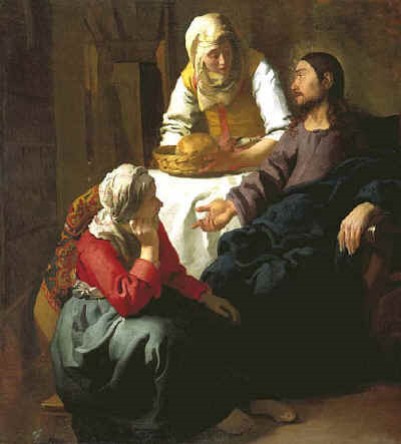 As we imagine Martha bustling around the house, waiting on Jesus and her other guests, while her sister Mary sits at his feet, we might be reminded of the old expression that someone is “so heavenly-minded that they’re no earthly-good.†It’s vital that we understand why that’s not the case because this is a sentiment that is rapidly spreading through our culture. There’s evidence of this all over, and it’s been especially obvious in the aftermath of mass shootings. Inevitably a public official will say that they’re praying for the victims and their families, to which a growing number will furiously respond that they need to stop “praying†and do something – and they’re both right.
As we imagine Martha bustling around the house, waiting on Jesus and her other guests, while her sister Mary sits at his feet, we might be reminded of the old expression that someone is “so heavenly-minded that they’re no earthly-good.†It’s vital that we understand why that’s not the case because this is a sentiment that is rapidly spreading through our culture. There’s evidence of this all over, and it’s been especially obvious in the aftermath of mass shootings. Inevitably a public official will say that they’re praying for the victims and their families, to which a growing number will furiously respond that they need to stop “praying†and do something – and they’re both right.
Something the Bible makes very clear is that while prayer is a good and proper response to life, it cannot be our only response. James writes explicitly that faith without any action is dead (see James 2:14-26), and we instinctively sense that that’s true because that’s how relationships work – you have to love in both word and action. Throughout all of Scripture, no one leaves an encounter with God unchanged. Their lives always take on new meaning and purpose, because whenever God blesses someone, it’s so that they themselves can be a blessing.
How then do we make sense of the fact that in this gospel passage, it’s Mary that Jesus points to as the example to follow? James helps us again, saying that we can’t receive anything from God without faith, because we’re “like a wave of the sea, driven and tossed by the wind†(see 1:6-7). That’s exactly what we see in Martha, who is “worried and distracted by many things.†She’s doing a lot of good things, but without faith; so instead of accomplishing God’s purposes, she’s being consumed by her own. Mary’s chosen the better part because, having encountered Jesus, she’s found the one thing out of which all the other good things will flow.
The reality is that the more “heavenly-minded†we become, the more driven and effective we’ll be in doing “earthly-good.†That’s a challenge first to those who jump in without praying, and do lots of good things, but not necessarily the best thing. However, I think the bigger challenge is to those who pray without jumping
in at all. If you’re not being led to act out of love, not only are you missing out on something Jesus is trying to give, but it supports the misconception that prayer is empty. The answer for both is to draw near to Jesus like Mary (and eventually Martha too), so that when we offer our lives and purposes to him, instead of bringing things like worry and distraction, the one thing necessary can work through us to produce peace, joy, and all other good things. love one another as I have loved you.’ (John 13:34). It is an awesome challenge that arises from the amazing love of Jesus.
Fr. McQueen +
Readings for this Sunday:
Genesis 8:1-14 Psalm 15 Colossians 1:21-29, Luke 10:38-42
|
RETURN TO TOP
This Sunday and Beyond - July 10th
Get it in PDF form with calendar
 The Good Samaritan is one of the best known and loved stories of Jesus. It appears only in Luke’s Gospel, but is entirely consistent with the teachings of Jesus. Love God with all your heart and love your neighbor as yourself. It is the Summary of the Law. If we want to follow God’s commandments and do God’s will, we should do these things. Of course, they are not small tasks, but encompass our entire spiritual life.
The Good Samaritan is one of the best known and loved stories of Jesus. It appears only in Luke’s Gospel, but is entirely consistent with the teachings of Jesus. Love God with all your heart and love your neighbor as yourself. It is the Summary of the Law. If we want to follow God’s commandments and do God’s will, we should do these things. Of course, they are not small tasks, but encompass our entire spiritual life.
The story begins when a lawyer asks “What must I do to inherit eternal life?†but ends with Jesus answering the question “And who is my neighbor?†It is not unusual for Jesus to answer our questions differently than we ask them. Indeed, I’ve found that God answers my prayers with new challenges and callings I’ve never considered. The story of the Good Samaritan is intended to force his disciples to look at things in a new way.
Here’s the story: A man is beset upon by robbers and left half dead on the side of the road. A priest and a Levite both pass him by, but they do nothing. Indeed, they go out of their way to avoid him. It’s both amazing and embarrassing to read about the religious leaders who pass by. How can they be so callous? Were they so concerned about themselves that they couldn’t see the needs of the man that lay before them? Thankfully, a Samaritan comes along with compassion and action. He helps the man, binds up his wounds, carries him to an inn, and promises to care for him.
The question ‘Who is my neighbor?’ becomes ‘Who behaves as neighbor.’ Sometimes, to follow God’s commandments we need to turn nouns into verbs, words into action. The neighbor is the one who showed mercy. As disciples, we ask ourselves, ‘Do I show mercy?†Am I compassionate and caring? Do I go out of my way to help others in need? Or, do I look away, keep walking, and try to forget. Am I a Levite or a Samaritan?
I’m glad that the Church is about helping others in need. I’m glad we understand that whenever we reach out to others we are receiving more grace and love than we can ever give another. Yes, we can only do so much, the need is so much greater than our resources. This will always be so. But, Jesus’ new commandment is ‘to love one another as I have loved you.’ (John 13:34). It is an awesome challenge that arises from the amazing love of Jesus.
Fr. Steven Schuneman,
Retired Priest in the Diocese of San Diego
Readings for this Sunday:
Deuteronomy 30:9-14 Psalm 25:3-9 Colossians 1: 1-14, Luke 10:25-37
|
RETURN TO TOP
This Sunday and Beyond - July 3rd
Get it in PDF form with calendar
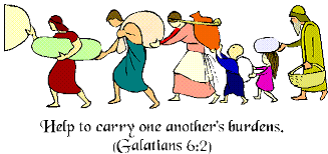 This Sunday we’ll read the end of Paul’s letter to the Galatians, where he says that he won’t allow himself to be troubled, “for I bear on my body the marks of Jesus.†This might seem really strange by itself, so we have to consider what it is that Paul’s concluding. The purpose of his letter was to combat the teaching of Judaizers, who were claiming that Christianity meant, first and foremost, keeping the Jewish laws. Paul argues instead that Jesus has freed them from the law, and not to ignore it, but to fulfill it by loving their neighbors as themselves. After several specific examples of how not to love your neighbor, Paul tells them, “Bear one another’s burdens, and so fulfill the law of Christ,†and this is what makes sense of him pointing to bearing the marks of Jesus.
This Sunday we’ll read the end of Paul’s letter to the Galatians, where he says that he won’t allow himself to be troubled, “for I bear on my body the marks of Jesus.†This might seem really strange by itself, so we have to consider what it is that Paul’s concluding. The purpose of his letter was to combat the teaching of Judaizers, who were claiming that Christianity meant, first and foremost, keeping the Jewish laws. Paul argues instead that Jesus has freed them from the law, and not to ignore it, but to fulfill it by loving their neighbors as themselves. After several specific examples of how not to love your neighbor, Paul tells them, “Bear one another’s burdens, and so fulfill the law of Christ,†and this is what makes sense of him pointing to bearing the marks of Jesus.
We see the “law of Christ†given at the Last Supper, where Jesus tells us to love one another as he has loved us (see Jn 13:34), which takes us way beyond just loving our neighbors as ourselves. Now we can start to understand the need for freedom, because we all experience the limits of how we love even ourselves. I do some good things for myself, but there are plenty of others that I don’t. Why don’t I do them if I know they’re good for me? Because they don’t feel good enough. For example, I don’t like eating healthy food as much as unhealthy food, I don’t like getting up early to exercise as much as I like staying in bed, and so on. I love my neighbor just about the same way as I love myself – some things I do, some I don’t, depending on whether I think it will make me feel better to do it than not to do it.
When it comes to how Jesus loves, there are no limits because he has made his life about us. The marks of Jesus are the inevitable result of bearing our burdens; of loving people who don’t want to be loved, staying close to someone who’s tearing their life apart, standing up for those who can’t stand up for themselves. The marks of Jesus prove that he will come into our suffering after us, even if it makes us hate him.
Loving like Jesus is what transforms people because it goes beyond what’s reasonable, but that’s also what makes it unbelievable. That’s why Paul is saying, “If I haven’t convinced you with my words, if you still don’t get it, look at my body; does it look like Jesus’ body? Look at my life; does it look like Jesus’ life?†There is no greater argument that the love of Jesus is real and that freedom through the gospel is possible than the testimony of our lives. Are we really free to love? What signs of it do we bear in our lives?
Fr. McQueen +
Readings for this Sunday:
Isaiah 66:10-16 Psalm 66:1-8 Galatians 6:1-10, 14-18 Luke 10:1-12, 16-20
|
RETURN TO TOP
This Sunday and Beyond - June 26th
Get it in PDF form with calendar
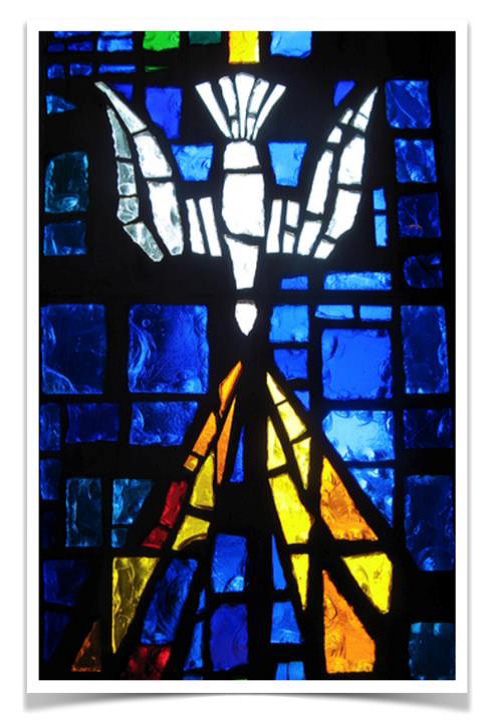 This Sunday’s passage from Galatians begins with Paul saying, “For freedom Christ has set us free. Stand firm therefore, and do not submit again to the yoke of slavery.†I think that a lot of people struggle with Christianity because they just don’t see freedom and slavery at work in their lives, at least not for what they really are.
This Sunday’s passage from Galatians begins with Paul saying, “For freedom Christ has set us free. Stand firm therefore, and do not submit again to the yoke of slavery.†I think that a lot of people struggle with Christianity because they just don’t see freedom and slavery at work in their lives, at least not for what they really are.
I think a lot of people start to tune Paul out when he says not to gratify the desires of the flesh and then lists them. They think, “but those are some of my favorites!â€, not seeing the slavery starting to take hold. Take pleasure as an example: Years of hook-ups and casual relationships don’t actually make you an “experienced lover,†but make it more difficult to experience true love at all. Love is a decision to make your life totally about another person, not a magic spell that somehow turns a selfish person selfless. In fact, the more you equate “love†with “pleasure,†the more you numb the desire for the real thing and then leave yourself unable to live into that kind of relationship when you want to. It feels like freedom in the beginning, but ends in slavery, which is why so many marriages fail and people that are never alone can be the loneliest.
The trouble is that we usually can’t tell the difference until we start to feel the chains of our “freedoms.†This was St. Augustine’s experience, which we’ll talk about in our class on the spiritual classic, The Fulfillment of All Desire (9:30-10:15, Fireside Room). By the time he realized that he wanted the “love, joy, peace, patience, kindness, goodness, faithfulness, gentleness, and self-control†that Paul tells us is the fruit of the Spirit, his life had already been heading in the opposite direction for a while. Even though it would take years to be free enough to live the life he wanted, the good news is that God began working in Augustine’s life immediately. He gave him a growing awareness of his bondage to loosen the chains and tastes of his freedom to encourage him, until finally Augustine was able to walk out of the prison he’d spent so many years building.
What about devotion to Jesus feels like slavery to you? What are the freedoms that you think he would be denying you? Be honest and bold in asking, because if your freedoms are really slavery, there’s no point in making the walls of your prison thicker by pretending they’re not.
Fr. McQueen
Readings for this Sunday:
Isaiah 66:10-16 Psalm 66:1-8 Galatians 6:1-10, 14-18 Luke 10:1-12, 16-20
|
RETURN TO TOP
This Sunday and Beyond - June 19th
Get it in PDF form with calendar
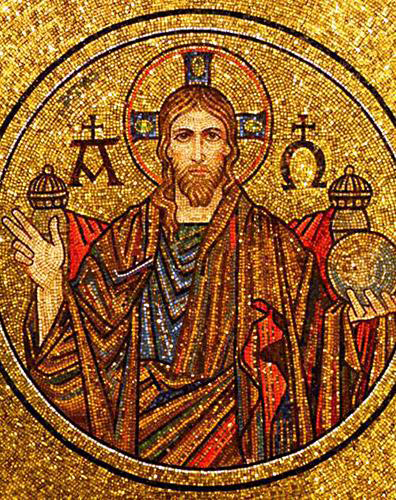 Sometimes I’m amazed when I realize how much time and trouble is going into some project that’s supposed to make my life simpler or easier! That’s not to say that working to make my life more pleasant isn’t worthwhile, but it is a sign to stop and consider whether my need for comfort and control has taken over how I understand my circumstances and make choices.
Sometimes I’m amazed when I realize how much time and trouble is going into some project that’s supposed to make my life simpler or easier! That’s not to say that working to make my life more pleasant isn’t worthwhile, but it is a sign to stop and consider whether my need for comfort and control has taken over how I understand my circumstances and make choices.
In Sunday’s gospel lesson, Jesus gives us a way to weigh our priorities when he says that any would-be disciple must deny themselves, take up their cross daily, and follow him. It’s fine to have desires and ambitions and there’s nothing wrong with minimizing the level of suffering or inconvenience, but we can’t be dominated by those things. Instead we have to judge them against our truest purpose, and when that presents us with difficulties, we pray for patience, courage, and any other grace we might need to meet them.
Jesus tells us to follow him because it’s only in remaining close that we can do that daily discernment. Without him, we don’t know when or how to lean into the challenges of our lives, and the evidence of that is all around us. People move from one relationship to another, but find that the same pattern seems to emerge every time. Others remain stuck in difficult situations because they can’t see what needs to be different, and may have even lost hope that it can be.
We save our lives by giving them to Jesus because he leads us out of the despair and frustration we fall into by trying to make our lives all about us. We’ll talk more about our need to surrender ourselves to God as we continue our class on the spiritual classic, The Fulfillment of All Desire (9:30 - 10:15, Fireside Room). We’ll also discuss some of the basic dynamics involved in the relationship and how it matures. While this requires all the effort we have to give, it’s what brings true simplicity to our lives and a deep joy that far outweighs mere pleasantness.
Fr. McQueen
Readings for this Sunday:
Zechariah 12:8-10; 13:1 Psalm 63:1-8 Galatians 3:23-29 Luke 9:18-24
|
RETURN TO TOP
This Sunday and Beyond - June 12th
Get it in PDF form with calendar
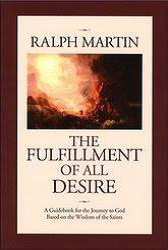 Every day we come across any number of things that can leave us disappointed with the world around us. It could be news of an international conflict, the actions of a political leader or celebrity, a local hit-and-run or home invasion. Just as often it comes on a personal level, when we learn of (or experience firsthand) things that have been said or done by people we know. No matter the form, all of these things present the opportunity to say, “I may not be perfect, but I’m not that bad,†an especially tempting thought for Christians or any other devout person committed to resisting those same inclinations.
Of course, this rush to judge others is nothing new and Jesus confronts it in Sunday’s gospel lesson. He uses a story of 2 men who were forgiven debts to make a couple of important points. The first is that even though the debt of one man 10x greater than the other, they began and ended with the same status – neither of them could pay and both were forgiven completely. It was only the generosity and mercy of the creditor that made a difference in their circumstances, and so Jesus’ other point is that our focus should not be on levels of justice, but relationship. We’ve all sinned and fallen short of the glory of God (Romans 3:23), and the greater our appreciation of that is, the deeper and more fulfilling our love for God will be.
When Jesus says that nothing is more important than loving God and those around us (cf. Mark 12:28-33; Matthew 22:36-40), he’s telling us that holiness is about growing in our capacity for love. This means growing in our capacity for self-sacrifice, but also for joy and thanksgiving, no matter our circumstances. Navigating these so that our love can flourish instead of decaying is not easy or natural, and so our Christian formation will resume on Sunday (9:30-10:15, Fireside Room) with a study of a guidebook, The Fulfillment of All Desire, by Dr. Ralph Martin. (Copies will be available for purchase at the class, but it’s also available on Amazon and through other large retailers.) Through the wisdom of the saints, Martin helps us to manage our ups and downs, so that even our failures can be used as rungs on the ladder to heaven."
Every day we come across any number of things that can leave us disappointed with the world around us. It could be news of an international conflict, the actions of a political leader or celebrity, a local hit-and-run or home invasion. Just as often it comes on a personal level, when we learn of (or experience firsthand) things that have been said or done by people we know. No matter the form, all of these things present the opportunity to say, “I may not be perfect, but I’m not that bad,†an especially tempting thought for Christians or any other devout person committed to resisting those same inclinations.
Of course, this rush to judge others is nothing new and Jesus confronts it in Sunday’s gospel lesson. He uses a story of 2 men who were forgiven debts to make a couple of important points. The first is that even though the debt of one man 10x greater than the other, they began and ended with the same status – neither of them could pay and both were forgiven completely. It was only the generosity and mercy of the creditor that made a difference in their circumstances, and so Jesus’ other point is that our focus should not be on levels of justice, but relationship. We’ve all sinned and fallen short of the glory of God (Romans 3:23), and the greater our appreciation of that is, the deeper and more fulfilling our love for God will be.
When Jesus says that nothing is more important than loving God and those around us (cf. Mark 12:28-33; Matthew 22:36-40), he’s telling us that holiness is about growing in our capacity for love. This means growing in our capacity for self-sacrifice, but also for joy and thanksgiving, no matter our circumstances. Navigating these so that our love can flourish instead of decaying is not easy or natural, and so our Christian formation will resume on Sunday (9:30-10:15, Fireside Room) with a study of a guidebook, The Fulfillment of All Desire, by Dr. Ralph Martin. (Copies will be available for purchase at the class, but it’s also available on Amazon and through other large retailers.) Through the wisdom of the saints, Martin helps us to manage our ups and downs, so that even our failures can be used as rungs on the ladder to heaven."
Fr. McQueen
Readings for this Sunday:
2 Samuel 11:26-12:10, 13-15 Psalm 32:1-8 Galatians 2:11-21 Luke 7:36-50
|
RETURN TO TOP
This Sunday and Beyond - June 5th
Get it in PDF form with calendar
 In Sunday's gospel lesson, as Jesus approaches the town gates of Nain, he meets a funeral procession for a young man, the only son of a widow. Moved with compassion, Jesus raised the dead man and "gave him back to his mother," a clear parallel to Elijah doing the same thing for the widow of Zarephath in the first lesson. Resurrection from the dead is foundational to the Christian faith, and the knowledge that our death will take us into God's love and mercy in heaven gives us hope. We should also take great comfort in the raising of these widows' sons, because it reminds us that we don't have to wait for our new lives to begin.
God created the world as the place for us to grow in our knowledge and love of him, and so even though that now happens imperfectly, our life on earth is still worth living. Jesus raises the widow's son, along with Jairus' daughter (Mark 5) and Lazarus (John 11), for the same reason that he heals the sick and infirm, feeds the hungry, and casts out demons: to redeem our whole lives, not just our deaths. He brings freedom from all the things that prey on us so that life is not something we put up with, but have in abundance (cf. John 10:10).
What in your life is in need of resurrection? What do you want Jesus to give you back? Bring him your frustration at work and your difficult circumstances at home. Invite him into your relationships and ask him to bring peace in anxiety and healing to hurts. Jesus always meets suffering with compassion and mercy, so don't wait until the end of your days for the new life that can begin today.
In Sunday's gospel lesson, as Jesus approaches the town gates of Nain, he meets a funeral procession for a young man, the only son of a widow. Moved with compassion, Jesus raised the dead man and "gave him back to his mother," a clear parallel to Elijah doing the same thing for the widow of Zarephath in the first lesson. Resurrection from the dead is foundational to the Christian faith, and the knowledge that our death will take us into God's love and mercy in heaven gives us hope. We should also take great comfort in the raising of these widows' sons, because it reminds us that we don't have to wait for our new lives to begin.
God created the world as the place for us to grow in our knowledge and love of him, and so even though that now happens imperfectly, our life on earth is still worth living. Jesus raises the widow's son, along with Jairus' daughter (Mark 5) and Lazarus (John 11), for the same reason that he heals the sick and infirm, feeds the hungry, and casts out demons: to redeem our whole lives, not just our deaths. He brings freedom from all the things that prey on us so that life is not something we put up with, but have in abundance (cf. John 10:10).
What in your life is in need of resurrection? What do you want Jesus to give you back? Bring him your frustration at work and your difficult circumstances at home. Invite him into your relationships and ask him to bring peace in anxiety and healing to hurts. Jesus always meets suffering with compassion and mercy, so don't wait until the end of your days for the new life that can begin today.
Fr. McQueen
Readings for this Sunday:
1 Kings 17:17-24
Psalm 30:1-6, 12-13
Galatians 1:11-24
Luke 7:11-17
|
RETURN TO TOP
This Sunday and Beyond - May 29nd
Get it in PDF form with calendar
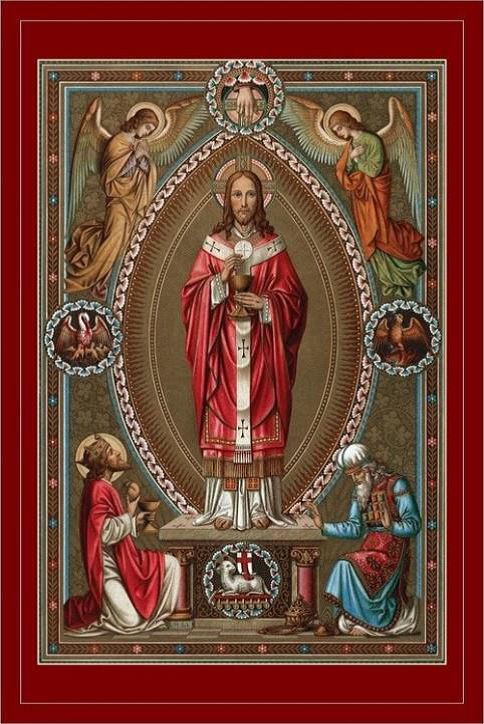 This Sunday we will celebrate "Corpus Christi," a feast commemorating the Real Presence of Jesus's Body and Blood in the bread and wine of the Holy Eucharist. In the day's gospel lesson, Jesus tells the crowds that those who eat his flesh and drink his blood will have eternal life and that he will abide in them. Here Jesus helps us see the spiritual reality of how his sacrifice gives us spiritual food, and that when we receive him, he sustains us and even becomes a part of us.
This is why he's so eager to eat the Passover with the disciples (cf. Luke 22:15) and institute the Eucharist. He's come to share every bit of his abundant life with us, and when we receive his Body and Blood, he comes so near that he can see and touch the places in us we didn't know were lacking. The more we keep our hearts open to receiving him, the more we can become in him everything good that we want to be for those we love.
For that reason, the feast also emphasizes the mission of the Church, the mystical Body of Christ, to bring Jesus to the world. We will represent this, as many churches do, with a Eucharistic procession that takes the Blessed Sacrament from the high altar out to the people and into St. Mary's Chapel, which will be set up for Eucharistic Adoration until 1:00 PM. During this time we can pray for the grace to, as St. Augustine put it, "Behold what you are, and become what you receive: the Body of Christ."
This Sunday we will celebrate "Corpus Christi," a feast commemorating the Real Presence of Jesus's Body and Blood in the bread and wine of the Holy Eucharist. In the day's gospel lesson, Jesus tells the crowds that those who eat his flesh and drink his blood will have eternal life and that he will abide in them. Here Jesus helps us see the spiritual reality of how his sacrifice gives us spiritual food, and that when we receive him, he sustains us and even becomes a part of us.
This is why he's so eager to eat the Passover with the disciples (cf. Luke 22:15) and institute the Eucharist. He's come to share every bit of his abundant life with us, and when we receive his Body and Blood, he comes so near that he can see and touch the places in us we didn't know were lacking. The more we keep our hearts open to receiving him, the more we can become in him everything good that we want to be for those we love.
For that reason, the feast also emphasizes the mission of the Church, the mystical Body of Christ, to bring Jesus to the world. We will represent this, as many churches do, with a Eucharistic procession that takes the Blessed Sacrament from the high altar out to the people and into St. Mary's Chapel, which will be set up for Eucharistic Adoration until 1:00 PM. During this time we can pray for the grace to, as St. Augustine put it, "Behold what you are, and become what you receive: the Body of Christ."
Fr. McQueen
Readings for this Sunday:
Deuteronomy 8:2-3, 14b-16a
Psalm 116:10-17
1 Corinthians 10:1-4, 16-17
John 6:47-58
|
RETURN TO TOP
This Sunday and Beyond - May 22nd
Get it in PDF form with calendar
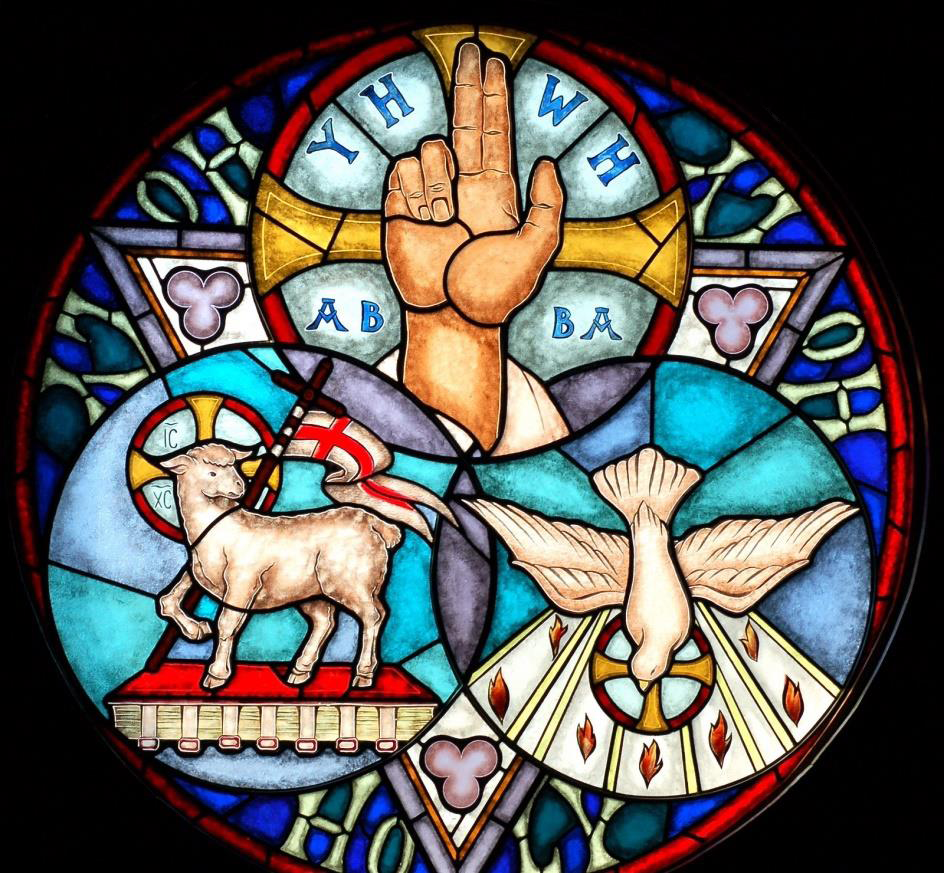 This Sunday is Trinity Sunday, where we celebrate the community of God, Father, Son, and Holy Spirit, our new family through the gift of the Holy Spirit, and the gospel lesson shows us something strange and wonderful about our life together. The disciples are sorrowful because Jesus will soon be leaving them, but he tells them it's better for them that he does. He will not leave them to fend for themselves, but send the Holy Spirit, who will comfort and guide them. Even though there will be times when it feels like we're all alone, the promise of the Holy Spirit is that God is always with us.
This Sunday is Trinity Sunday, where we celebrate the community of God, Father, Son, and Holy Spirit, our new family through the gift of the Holy Spirit, and the gospel lesson shows us something strange and wonderful about our life together. The disciples are sorrowful because Jesus will soon be leaving them, but he tells them it's better for them that he does. He will not leave them to fend for themselves, but send the Holy Spirit, who will comfort and guide them. Even though there will be times when it feels like we're all alone, the promise of the Holy Spirit is that God is always with us.
As the Body of Christ on earth, the Church provides a visible sign of that presence and unity, and on Sunday we will see this especially in having Bishop Jim Mathes with us. The bishop connects us not just with the rest of our diocese or even the worldwide Anglican Communion, but with our whole Christian heritage, going all the way back to the 12 apostles and Jesus himself. We'll also be living into our mission to care for the whole human family by assembling Blessing Bags to support the hungry and needy around us. It is an incredible gift of love for God to welcome us into his own heart and Trinity Sunday gives us a special reminder at how eager we should be to share it.
Fr. McQueen
Readings for this Sunday:
Isaiah 6:1-8
Psalm 29
Revelation 4:1-11
John 16:5-15
|
RETURN TO TOP
This Sunday and Beyond - May 15th
Get it in PDF form with calendar
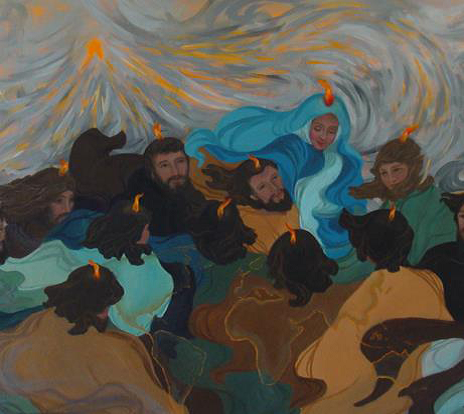 This Sunday we will celebrate Pentecost, one of the high feasts of the Christian year, where we celebrate the coming of the Holy Spirit and its resting on each of the disciples like a tongue of fire. Filled with the Holy Spirit, they begin sharing the good news of Jesus Christ with all those gathered in the streets of Jerusalem and everyone hears the gospel in their own native language.
It's necessary that the Holy Spirit continues this miraculous translation in us because love is not always easy to understand, especially when it's teaching us something difficult or pulling us out of some dark place. Only through the Holy Spirit opening our hearts and minds are we able to see what God is doing in our lives and receive it. Then, when we join in that work and share it with others, like the disciples at Pentecost, the Holy Spirit uses our words and deeds to make the love of Jesus intelligible to those around us.
We'll talk about the ways that we can do that in our class on mature Christian discipleship (9:30, Fireside Room), but it comes back to something simple: nothing transcends times, places, and cultures like seeing the love and mercy of God in action. Nothing helps translate its mysteries like hearing, "This is what He has done for me." Filled with the Holy Spirit, our lives too can proclaim the gospel with tongues of fire, and set those around us burning as well.
This Sunday we will celebrate Pentecost, one of the high feasts of the Christian year, where we celebrate the coming of the Holy Spirit and its resting on each of the disciples like a tongue of fire. Filled with the Holy Spirit, they begin sharing the good news of Jesus Christ with all those gathered in the streets of Jerusalem and everyone hears the gospel in their own native language.
It's necessary that the Holy Spirit continues this miraculous translation in us because love is not always easy to understand, especially when it's teaching us something difficult or pulling us out of some dark place. Only through the Holy Spirit opening our hearts and minds are we able to see what God is doing in our lives and receive it. Then, when we join in that work and share it with others, like the disciples at Pentecost, the Holy Spirit uses our words and deeds to make the love of Jesus intelligible to those around us.
We'll talk about the ways that we can do that in our class on mature Christian discipleship (9:30, Fireside Room), but it comes back to something simple: nothing transcends times, places, and cultures like seeing the love and mercy of God in action. Nothing helps translate its mysteries like hearing, "This is what He has done for me." Filled with the Holy Spirit, our lives too can proclaim the gospel with tongues of fire, and set those around us burning as well.
Fr. McQueen
Readings for this Sunday:
Acts: 2:1-11 Psalm 104:25-32 1 Corinthians 12:4-13 John 20:19-23
|
RETURN TO TOP
This Sunday and Beyond - May 8th
Get it in PDF form with calendar
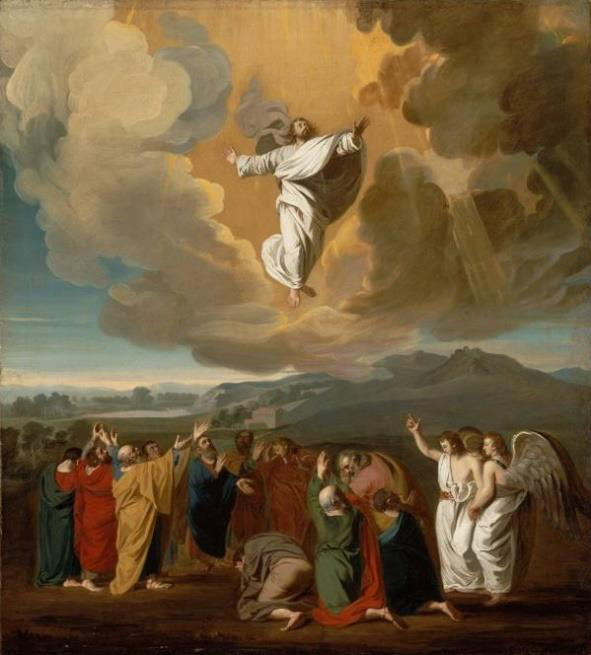 Luke ends his gospel with the Ascension of Jesus into heaven and then begins his sequel, the Acts of the Apostles, with the same event. The reason, he tells us in the opening verse of Acts, is that his first book dealt with all that Jesus began to do and teach until his Ascension, making clear that what would follow were things that Jesus had continued to do since.
This Sunday falls right in the middle of this transition, where Jesus goes from acting through his historical body to his mystical body, the Church. This is why in the gospel lesson Jesus prays not only for the union of the disciples with him and the Father, but with each other, so that through them everyone might know that the Father sent Jesus out of love for the world.
In last week's Sunday morning Christian formation we talked about this as the identity and mission of the Church; that it's through us, that the world encounters Jesus. We'll continue that discussion this week in talking about how the Church does this through our life together in the word and sacraments.
Come and See,
Luke ends his gospel with the Ascension of Jesus into heaven and then begins his sequel, the Acts of the Apostles, with the same event. The reason, he tells us in the opening verse of Acts, is that his first book dealt with all that Jesus began to do and teach until his Ascension, making clear that what would follow were things that Jesus had continued to do since.
This Sunday falls right in the middle of this transition, where Jesus goes from acting through his historical body to his mystical body, the Church. This is why in the gospel lesson Jesus prays not only for the union of the disciples with him and the Father, but with each other, so that through them everyone might know that the Father sent Jesus out of love for the world.
In last week's Sunday morning Christian formation we talked about this as the identity and mission of the Church; that it's through us, that the world encounters Jesus. We'll continue that discussion this week in talking about how the Church does this through our life together in the word and sacraments.
Come and See,
Fr. McQueen
Readings for this Sunday:
Acts: 16:16-34 Psalm 47 Revelation 22:12-14, 16-17, 20 John 17:20-26
|
RETURN TO TOP
This Sunday and Beyond - May 1st
Get it in PDF form with calendar
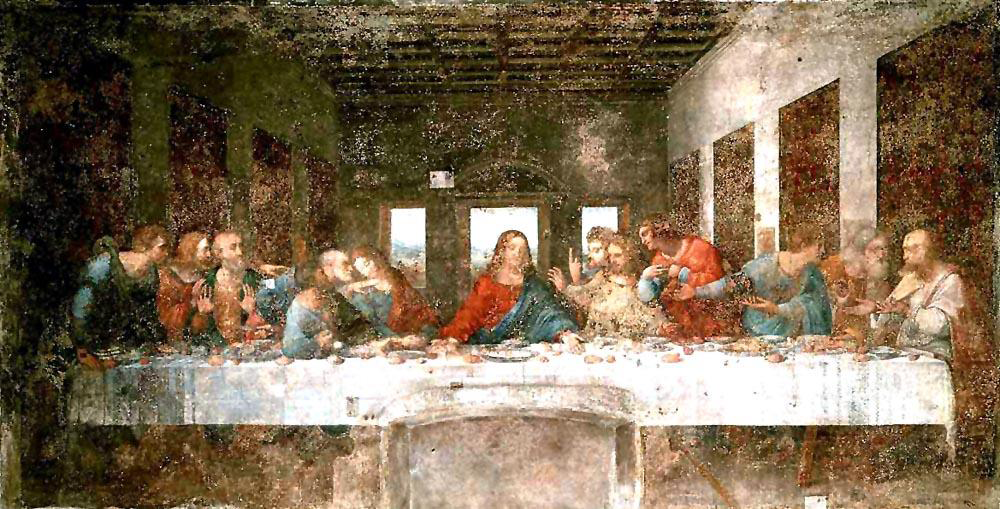 In this Sunday's gospel lesson from John's account of the last supper, Jesus tells the disciples that if they love him, they'll keep his words. He says this not to lean on them or put pressure on them, but so that he and the Father can "make their home in them." This reminds me of one of my favorite prayers, which asks for the grace to be cleansed from sin so that when Jesus comes he'll find a mansion prepared in us. Both point to the reality that our actions reveal what or who we love. How do we spend most of our money? What do we do with our time when we have control over it? Often our calendars and bank statements remind us that centering our lives on Jesus doesn't just happen on its own.
In this Sunday's gospel lesson from John's account of the last supper, Jesus tells the disciples that if they love him, they'll keep his words. He says this not to lean on them or put pressure on them, but so that he and the Father can "make their home in them." This reminds me of one of my favorite prayers, which asks for the grace to be cleansed from sin so that when Jesus comes he'll find a mansion prepared in us. Both point to the reality that our actions reveal what or who we love. How do we spend most of our money? What do we do with our time when we have control over it? Often our calendars and bank statements remind us that centering our lives on Jesus doesn't just happen on its own.
Committing ourselves to a personal relationship with him has been the focus of our Sunday morning Christian formation (9:30, Fireside Room in Parish Hall). This Sunday we'll start looking at how we live together as members of his own body, the Church, and encounter him in the places he promises to meet us, the sacraments. Learning to do this treasures the beauty of what Jesus has given us and stokes the fire that makes our hearts a home for him.
Come and See,
Fr. McQueen
Readings for this Sunday:
Acts: 14:8-18 Psalm 67 Revelation 21:22-22:5 John 14:23-29
|
RETURN TO TOP
|


 Several weeks ago a friend shared that everywhere he turned, whether on the news or in personal his interactions, he was seeing people struggling with some combination of fear, hurt, anger, and anxiety. As his awareness grew, he began praying for all those suffering in that way, that by the grace of God they would be freed to fully receive our Lord with peace and joy at Christmas. I was happy to join him in that prayer, and now that Advent is coming to an end, I think our next step is to make sure that we fully receive him in our own Christmas celebrations.
Several weeks ago a friend shared that everywhere he turned, whether on the news or in personal his interactions, he was seeing people struggling with some combination of fear, hurt, anger, and anxiety. As his awareness grew, he began praying for all those suffering in that way, that by the grace of God they would be freed to fully receive our Lord with peace and joy at Christmas. I was happy to join him in that prayer, and now that Advent is coming to an end, I think our next step is to make sure that we fully receive him in our own Christmas celebrations. As we get closer and closer to the birth of Jesus, it’s appropriate that on the last Sunday of Advent we’re presented with an important part of every pregnancy: naming the child, which can sometimes be a real struggle for expectant parents. Possibilities are often rigorously examined for things like rhyming potential and unfortunate associations, and subjected to additional third-party testing, based on the availability of honest but non-judgmental friends. Parents do all these things because they know that the child’s name will be a significant part of the foundation their identity will be built on, and we see this in the Bible too. Names always reveal the person’s identity and mission, so any time we see God giving a name, we should pay special attention, especially if that person is God’s own Son.
As we get closer and closer to the birth of Jesus, it’s appropriate that on the last Sunday of Advent we’re presented with an important part of every pregnancy: naming the child, which can sometimes be a real struggle for expectant parents. Possibilities are often rigorously examined for things like rhyming potential and unfortunate associations, and subjected to additional third-party testing, based on the availability of honest but non-judgmental friends. Parents do all these things because they know that the child’s name will be a significant part of the foundation their identity will be built on, and we see this in the Bible too. Names always reveal the person’s identity and mission, so any time we see God giving a name, we should pay special attention, especially if that person is God’s own Son. Throughout the season of Advent the Church gives us Isaiah’s prophecies to help us join the people of Israel in their waiting for the Messiah. We’re reminded of the promises of healing and peace and then watch them being fulfilled through Jesus. Then, just in case we’re not getting it, Jesus connects the dots for us, explicitly pointing to his works as irrefutable proof that he is in fact the one they’ve been waiting for. That seems like cause for rejoicing, so why does Jesus then add, “And blessed is he who takes no offense at me� Because unfulfilled desires and expectations are often what separate us from Jesus and leave us blind to the miracles he’s working in our lives.
Throughout the season of Advent the Church gives us Isaiah’s prophecies to help us join the people of Israel in their waiting for the Messiah. We’re reminded of the promises of healing and peace and then watch them being fulfilled through Jesus. Then, just in case we’re not getting it, Jesus connects the dots for us, explicitly pointing to his works as irrefutable proof that he is in fact the one they’ve been waiting for. That seems like cause for rejoicing, so why does Jesus then add, “And blessed is he who takes no offense at me� Because unfulfilled desires and expectations are often what separate us from Jesus and leave us blind to the miracles he’s working in our lives. “The world is full of good people, if you can’t fine one, be one.†Mother Teresa.
“The world is full of good people, if you can’t fine one, be one.†Mother Teresa. This Sunday we enter Advent, the season in which we prepare for the comings of our Lord Jesus Christ. While the season will culminate with our celebration of Jesus’ birth at Christmas – his first, historical coming – we can’t forget that there are two others: his final coming “with power and great glory†and his ongoing one. At his birth in Bethlehem, the Word of God himself enters human history, and the Advent Mass readings provide the context for that. In the Old Testament readings from the prophets we hear the message of hope in the coming Messiah and how he would be recognized. In the Gospel readings we hear John the Baptist preparing the people of that specific time, reminding them of the prophecies and calling them to repentance. In this Sunday’s gospel, Jesus himself reminds us that this call is no less urgent today, as his final coming will be at an “unexpected hour.â€
This Sunday we enter Advent, the season in which we prepare for the comings of our Lord Jesus Christ. While the season will culminate with our celebration of Jesus’ birth at Christmas – his first, historical coming – we can’t forget that there are two others: his final coming “with power and great glory†and his ongoing one. At his birth in Bethlehem, the Word of God himself enters human history, and the Advent Mass readings provide the context for that. In the Old Testament readings from the prophets we hear the message of hope in the coming Messiah and how he would be recognized. In the Gospel readings we hear John the Baptist preparing the people of that specific time, reminding them of the prophecies and calling them to repentance. In this Sunday’s gospel, Jesus himself reminds us that this call is no less urgent today, as his final coming will be at an “unexpected hour.â€ Jesus Christ is King of Kings, and Lord of Lords. No earthly power can match or supplant the place of Jesus Christ in our lives. Sometimes, we need to be reminded that the heavenly Jerusalem is so much greater than anything we see on this earth. Jesus Christ is the restorer of the Kingdom of God, the deliverer of God’s grace, love and forgiveness.
Jesus Christ is King of Kings, and Lord of Lords. No earthly power can match or supplant the place of Jesus Christ in our lives. Sometimes, we need to be reminded that the heavenly Jerusalem is so much greater than anything we see on this earth. Jesus Christ is the restorer of the Kingdom of God, the deliverer of God’s grace, love and forgiveness. Blessed Lord, who caused all holy Scriptures to be written for our learning: Grant us so to hear them, read, mark, learn, and inwardly digest them, that we may embrace and ever hold fast the blessed hope of everlasting life, which you have given us in our Savior Jesus Christ; who lives and reigns with you and the Holy Spirit, one God, for ever and ever. Amen.
Blessed Lord, who caused all holy Scriptures to be written for our learning: Grant us so to hear them, read, mark, learn, and inwardly digest them, that we may embrace and ever hold fast the blessed hope of everlasting life, which you have given us in our Savior Jesus Christ; who lives and reigns with you and the Holy Spirit, one God, for ever and ever. Amen. What is heaven? What is it like? Who will we see there? These are pretty common questions for many people. It falls under the category: Meaning of Life. Understanding what happens after life helps us understand our purpose and the meaning of life. Does our life matter? Is there anything of lastly value that exists after we have died? What happens when we finally close our eyes and breathe our last?
What is heaven? What is it like? Who will we see there? These are pretty common questions for many people. It falls under the category: Meaning of Life. Understanding what happens after life helps us understand our purpose and the meaning of life. Does our life matter? Is there anything of lastly value that exists after we have died? What happens when we finally close our eyes and breathe our last? This Sunday we’ll celebrate All Saints Day, our namesake and one of the most important feasts of the Church year. It’s an especially appropriate day for baptizing and for recalling our own baptismal vows, which we’ll renew as part of the Mass. In this renewal we’ll reaffirm the basic tenets our Christian belief, as we do every Sunday, as well as how we will live those out. These include participating in the worship of the Church at Mass and regularly repenting and returning to the Lord. We also promise, with God’s help, to proclaim the gospel in word and deed, to seek and serve Christ in all persons, to strive for justice and peace, and to respect the dignity of every human being. We make these promises because in the measure that we keep them, we reveal the love of God the Father in Jesus to the world around us.
This Sunday we’ll celebrate All Saints Day, our namesake and one of the most important feasts of the Church year. It’s an especially appropriate day for baptizing and for recalling our own baptismal vows, which we’ll renew as part of the Mass. In this renewal we’ll reaffirm the basic tenets our Christian belief, as we do every Sunday, as well as how we will live those out. These include participating in the worship of the Church at Mass and regularly repenting and returning to the Lord. We also promise, with God’s help, to proclaim the gospel in word and deed, to seek and serve Christ in all persons, to strive for justice and peace, and to respect the dignity of every human being. We make these promises because in the measure that we keep them, we reveal the love of God the Father in Jesus to the world around us. It’s hard for us to appreciate just how shocking it would have been for the people of Jesus’ time to hear this parable. On one hand, tax collectors were despised for basically using the occupying Roman forces to extort their fellow Jews; often collecting more than the law required and pocketing the extra. On the other hand, Pharisees were their undisputed religious leaders, the most respected members of the community. Yet, it’s the tax collector Jesus praises for actually making a connection with God, the purpose of prayer, and the Pharisee who’s criticized for only making a connection with himself.
It’s hard for us to appreciate just how shocking it would have been for the people of Jesus’ time to hear this parable. On one hand, tax collectors were despised for basically using the occupying Roman forces to extort their fellow Jews; often collecting more than the law required and pocketing the extra. On the other hand, Pharisees were their undisputed religious leaders, the most respected members of the community. Yet, it’s the tax collector Jesus praises for actually making a connection with God, the purpose of prayer, and the Pharisee who’s criticized for only making a connection with himself. In this Sunday’s gospel lesson, Jesus gives us a parable reminding us of our need to pray always and not to lose heart. He gives the example of a widow stubbornly demanding justice from an unjust judge, who finally gives in simply to get rid of her. Of course his point is that if persistence can bring about justice through an unjust judge, we should have the utmost confidence in coming to God, who is Justice and Love itself.
Even though we know we need God’s help to meet the challenges of our lives, we don’t always have the same “holy tenacity†of that widow. We give up too easily when we can’t see anything happening and God seems silent, and the effects of this can be devastating. Jesus shows us this tragedy from God’s point of view in a rhetorical question that completes verse 8 (but for some reason is omitted from the lesson): “Nevertheless, when the Son of man comes, will he find faith on earth?â€
He’s referring to his second coming at the final judgment, and wondering aloud whether there will be anyone left who really believes in him. While this might sound like exasperation or cynicism, what we’re really seeing is Jesus baring his broken heart, and that of the Father, to us. He’s just promised that God will never abandon us, and yet he knows that some of us will give up on God. Far too many people let this experience gradually dim the light of God in their lives, and even extinguish it when a particularly desperate plea seems to have gone unanswered.
So Jesus expresses an anguished plea of his own, hoping that we might be encouraged to trust and persevere, to stick with him through thick and thin, and not let life’s difficulties wear us down. The way that we do that is to be constant in our prayer, offering everything that comes our way back to God and waiting on God’s answer. If we’re doing all the talking, we shouldn’t be surprised when we don’t hear his response. We have to be humble enough to let his will be done and quiet enough to notice when he’s trying to move us in another direction.
A very simple way to start is with 10 minutes in the morning, 5 minutes in the middle of the day, and another 10 at night. Share what’s going on in your life, and also think about what you have trouble submitting or entrusting to God’s will. Whatever you do, be sure to leave space for silence, to sit and listen with an open heart and mind. If we’re faithful in doing this, we’ll soon find that it would be harder to stop going to God than to keep coming.
In this Sunday’s gospel lesson, Jesus gives us a parable reminding us of our need to pray always and not to lose heart. He gives the example of a widow stubbornly demanding justice from an unjust judge, who finally gives in simply to get rid of her. Of course his point is that if persistence can bring about justice through an unjust judge, we should have the utmost confidence in coming to God, who is Justice and Love itself.
Even though we know we need God’s help to meet the challenges of our lives, we don’t always have the same “holy tenacity†of that widow. We give up too easily when we can’t see anything happening and God seems silent, and the effects of this can be devastating. Jesus shows us this tragedy from God’s point of view in a rhetorical question that completes verse 8 (but for some reason is omitted from the lesson): “Nevertheless, when the Son of man comes, will he find faith on earth?â€
He’s referring to his second coming at the final judgment, and wondering aloud whether there will be anyone left who really believes in him. While this might sound like exasperation or cynicism, what we’re really seeing is Jesus baring his broken heart, and that of the Father, to us. He’s just promised that God will never abandon us, and yet he knows that some of us will give up on God. Far too many people let this experience gradually dim the light of God in their lives, and even extinguish it when a particularly desperate plea seems to have gone unanswered.
So Jesus expresses an anguished plea of his own, hoping that we might be encouraged to trust and persevere, to stick with him through thick and thin, and not let life’s difficulties wear us down. The way that we do that is to be constant in our prayer, offering everything that comes our way back to God and waiting on God’s answer. If we’re doing all the talking, we shouldn’t be surprised when we don’t hear his response. We have to be humble enough to let his will be done and quiet enough to notice when he’s trying to move us in another direction.
A very simple way to start is with 10 minutes in the morning, 5 minutes in the middle of the day, and another 10 at night. Share what’s going on in your life, and also think about what you have trouble submitting or entrusting to God’s will. Whatever you do, be sure to leave space for silence, to sit and listen with an open heart and mind. If we’re faithful in doing this, we’ll soon find that it would be harder to stop going to God than to keep coming.
 Gratitude and grace are two words and themes that we see in the readings today. They are important words as we come to understand our journey of faith in this life. If we hold them together, we can better come to appreciate the meaning of life and what is essential for us.
Gratitude and grace are two words and themes that we see in the readings today. They are important words as we come to understand our journey of faith in this life. If we hold them together, we can better come to appreciate the meaning of life and what is essential for us. When looking at something beautiful, I’ve found that it is often helpful to take a couple of steps back, just to see the whole picture. Then, I am filled with amazement and even greater understanding. That is true of reading the Bible, as well. Sometimes, it makes sense to step back a few verses and see the context of the reading for a deeper understanding.
When looking at something beautiful, I’ve found that it is often helpful to take a couple of steps back, just to see the whole picture. Then, I am filled with amazement and even greater understanding. That is true of reading the Bible, as well. Sometimes, it makes sense to step back a few verses and see the context of the reading for a deeper understanding. In the gospel lesson for this Sunday, Jesus’ parable makes it very clear that the way we live our lives carries eternal significance. In it we see a stark contrast between a man who is fantastically wealthy in life and tormented in eternity, and a man named Lazarus, who lives his life in utter misery but finds eternal comfort. Seeing this, the rich man cries out for mercy, but Abraham tells him, “Son, remember that you in your lifetime received your good things, and Lazarus in like manner evil things; but now he is comforted here, and you are in anguish.â€
In the gospel lesson for this Sunday, Jesus’ parable makes it very clear that the way we live our lives carries eternal significance. In it we see a stark contrast between a man who is fantastically wealthy in life and tormented in eternity, and a man named Lazarus, who lives his life in utter misery but finds eternal comfort. Seeing this, the rich man cries out for mercy, but Abraham tells him, “Son, remember that you in your lifetime received your good things, and Lazarus in like manner evil things; but now he is comforted here, and you are in anguish.â€ The gospel lesson for this Sunday contains a verse (Luke 16:10) that I purposefully call to mind every day: “He who is faithful in a very little is faithful also in much; and whoever is dishonest in a very little is dishonest also in much.†It’s an important admonition not to devalue any of the day’s tasks and interactions, or think that they’re somehow separate from our relationship with God. While I can appreciate how this might sound like an impossible burden, for me, being reminded that even the smallest of things matter actually lifts that weight off my shoulders.
The gospel lesson for this Sunday contains a verse (Luke 16:10) that I purposefully call to mind every day: “He who is faithful in a very little is faithful also in much; and whoever is dishonest in a very little is dishonest also in much.†It’s an important admonition not to devalue any of the day’s tasks and interactions, or think that they’re somehow separate from our relationship with God. While I can appreciate how this might sound like an impossible burden, for me, being reminded that even the smallest of things matter actually lifts that weight off my shoulders. Because God has made us in his own image, the characteristics and dynamics of human life often provide a vocabulary for helping us learn something about God. However, we also have to be careful not to work backwards and assign God the same imperfections we have as fallen creatures, as we see the Pharisees and scribes doing in today’s gospel lesson. They have no trouble whatsoever writing off the tax collectors and sinners, but in his parables Jesus shows us what God really thinks of these “lost causes.â€
Because God has made us in his own image, the characteristics and dynamics of human life often provide a vocabulary for helping us learn something about God. However, we also have to be careful not to work backwards and assign God the same imperfections we have as fallen creatures, as we see the Pharisees and scribes doing in today’s gospel lesson. They have no trouble whatsoever writing off the tax collectors and sinners, but in his parables Jesus shows us what God really thinks of these “lost causes.â€ The second lesson for this Sunday is Paul’s letter to Philemon, where we have an example of the radical difference faith in Jesus makes in our lives and in the world. The subject of the letter is a man named Onesimus, a slave who had run away from his master Philemon, a friend and convert of Paul’s. He had made his way to Rome, where, under Paul’s care, he too had become a Christian. Paul is now sending Onesimus back with this note, asking Philemon to forgive him and accept him back not as a slave, but as a brother in Christ. While the world would have seen this as unthinkable, Paul has every expectation that his request will be granted because he’s asking Philemon to see this through the eyes of Jesus.
The second lesson for this Sunday is Paul’s letter to Philemon, where we have an example of the radical difference faith in Jesus makes in our lives and in the world. The subject of the letter is a man named Onesimus, a slave who had run away from his master Philemon, a friend and convert of Paul’s. He had made his way to Rome, where, under Paul’s care, he too had become a Christian. Paul is now sending Onesimus back with this note, asking Philemon to forgive him and accept him back not as a slave, but as a brother in Christ. While the world would have seen this as unthinkable, Paul has every expectation that his request will be granted because he’s asking Philemon to see this through the eyes of Jesus. In his parable about finding a seat at a wedding banquet, Jesus is teaching us about more than prudence or good manners. By directing us to choose the lowest place, Jesus is showing us the way God’s kingdom always comes. Throughout the Old Testament we see God choosing to work through the refugee, the barren women, and the younger sons, and the New Testament is no different. When God himself enters the world, it’s not as a pillar of cloud or fire, a majestic, celestial being, or even an earthly prince. He comes instead as the son of a poor couple living in the country, and only after asking the young virgin’s permission. Jesus was rejected by the rulers and authorities and even fled from earthly power when it was offered to him. At every turn he chose to reveal God’s glory to the poor, sick, weak, and marginalized because the way of the kingdom is the way of love.
In his parable about finding a seat at a wedding banquet, Jesus is teaching us about more than prudence or good manners. By directing us to choose the lowest place, Jesus is showing us the way God’s kingdom always comes. Throughout the Old Testament we see God choosing to work through the refugee, the barren women, and the younger sons, and the New Testament is no different. When God himself enters the world, it’s not as a pillar of cloud or fire, a majestic, celestial being, or even an earthly prince. He comes instead as the son of a poor couple living in the country, and only after asking the young virgin’s permission. Jesus was rejected by the rulers and authorities and even fled from earthly power when it was offered to him. At every turn he chose to reveal God’s glory to the poor, sick, weak, and marginalized because the way of the kingdom is the way of love. If the references to God’s coming in judgment in Sunday’s passages from Isaiah and the letter to the Hebrews have us squirming, the gospel lesson doesn’t let us off the hook. Whether we allow ourselves to dwell on it or not, when the man asks, “Will only a few be saved,†he’s expressing the deepest concern of our hearts as well. For Jesus to respond “Strive to enter by the narrow door,†because not everyone who thinks they ought to be saved will be can (and should!) leave us at least a little unsettled, wondering what went wrong for them.
If the references to God’s coming in judgment in Sunday’s passages from Isaiah and the letter to the Hebrews have us squirming, the gospel lesson doesn’t let us off the hook. Whether we allow ourselves to dwell on it or not, when the man asks, “Will only a few be saved,†he’s expressing the deepest concern of our hearts as well. For Jesus to respond “Strive to enter by the narrow door,†because not everyone who thinks they ought to be saved will be can (and should!) leave us at least a little unsettled, wondering what went wrong for them. I’m not a morning person. While daily Bible reading and morning prayer is the first scheduled activity on my calendar every day, I’d be just as happy to do this at 10 or 11 AM instead of the usual 7. I trust God understands my heart is his even if my eyes struggle to focus on the words before me. I hope that my offering of the first minutes of my day not only gets the day off to the best start, but represents an acceptable sacrifice as best as I’m able to offer at that time.
I have to confess that if an angel ever appeared to me during my morning prayer time, my response to any message delivered would fall far short of the beautiful Magnificat of Mary as recorded in the Gospel of Luke. I’d be much more likely to beg off playing any role in God’s plan of universal salvation with excuses of inadequacy rather than offering soaring and unreserved praise. Maybe one reason my Creator hasn’t blessed me with an angelic visitation yet is because He knows me so well.
But my regular religious practice does help me encounter the Lord in ways in which I’m frequently surprised, whether in the words of Holy Scripture, through my own my feeble prayers, or when receiving the Sacraments. If I feel him ask me to serve him in some way I hadn’t previously considered, I draw comfort from my confidence that whenever God speaks to us, it is in a manner particularly suited for us to offer willing assent. For this reason, the words of Mary not only impress me, but they also inspire me.
I’m also inspired by the recognition that when God upends human expectations, as he does so frequently throughout the Bible, the men and women who cooperate with his will are blessed in ways they probably couldn’t imagine before their encounter with Him. So, just as the devout Jewish girl probably had no idea what it would mean to accept the call to be the human mother of God’s incarnate Son, when I follow the Holy Spirit’s prompting, even with a halting and hesitant yes, my first step in obedience not only takes my faith in new and wondrous directions, it might even, by the grace of God, change the world. And that’s worth getting up for at any hour.
Rick Ochocki, member of All Saints’ Parish
I’m not a morning person. While daily Bible reading and morning prayer is the first scheduled activity on my calendar every day, I’d be just as happy to do this at 10 or 11 AM instead of the usual 7. I trust God understands my heart is his even if my eyes struggle to focus on the words before me. I hope that my offering of the first minutes of my day not only gets the day off to the best start, but represents an acceptable sacrifice as best as I’m able to offer at that time.
I have to confess that if an angel ever appeared to me during my morning prayer time, my response to any message delivered would fall far short of the beautiful Magnificat of Mary as recorded in the Gospel of Luke. I’d be much more likely to beg off playing any role in God’s plan of universal salvation with excuses of inadequacy rather than offering soaring and unreserved praise. Maybe one reason my Creator hasn’t blessed me with an angelic visitation yet is because He knows me so well.
But my regular religious practice does help me encounter the Lord in ways in which I’m frequently surprised, whether in the words of Holy Scripture, through my own my feeble prayers, or when receiving the Sacraments. If I feel him ask me to serve him in some way I hadn’t previously considered, I draw comfort from my confidence that whenever God speaks to us, it is in a manner particularly suited for us to offer willing assent. For this reason, the words of Mary not only impress me, but they also inspire me.
I’m also inspired by the recognition that when God upends human expectations, as he does so frequently throughout the Bible, the men and women who cooperate with his will are blessed in ways they probably couldn’t imagine before their encounter with Him. So, just as the devout Jewish girl probably had no idea what it would mean to accept the call to be the human mother of God’s incarnate Son, when I follow the Holy Spirit’s prompting, even with a halting and hesitant yes, my first step in obedience not only takes my faith in new and wondrous directions, it might even, by the grace of God, change the world. And that’s worth getting up for at any hour.
Rick Ochocki, member of All Saints’ Parish
 "Be dressed for action and have your lamps lit; be like those who are waiting for their master to return from the wedding banquet, so that they may open the door for him as soon as he comes and knocks.†(Luke 12:35-36)
"Be dressed for action and have your lamps lit; be like those who are waiting for their master to return from the wedding banquet, so that they may open the door for him as soon as he comes and knocks.†(Luke 12:35-36) Whenever I read today’s Gospel I am struck by the question that someone asks Jesus, "Teacher, tell my brother to divide the family inheritance with me.†(Luke 12:13) I can’t imagine asking Jesus a question about inheritance or family matters. Jesus’ time on earth is so special and precious to us, that it seems wrong to ask him this question. I fully understand when people ask about eternal life, one of the commandments or even question him about the Sabbath day. These are spiritual or religious questions that were important then as they are important today. But, it was common to ask a rabbi to serve as arbitrator in family disputes. As a priest, I’ve certainly been asked to help smooth things over between family and friends, and I’ve tried my best to do right in these situations. But, I’m glad no one has ever asked me this kind of question.
Whenever I read today’s Gospel I am struck by the question that someone asks Jesus, "Teacher, tell my brother to divide the family inheritance with me.†(Luke 12:13) I can’t imagine asking Jesus a question about inheritance or family matters. Jesus’ time on earth is so special and precious to us, that it seems wrong to ask him this question. I fully understand when people ask about eternal life, one of the commandments or even question him about the Sabbath day. These are spiritual or religious questions that were important then as they are important today. But, it was common to ask a rabbi to serve as arbitrator in family disputes. As a priest, I’ve certainly been asked to help smooth things over between family and friends, and I’ve tried my best to do right in these situations. But, I’m glad no one has ever asked me this kind of question. When the disciples ask Jesus to teach them to pray, how does he respond? He starts with a specific prayer, but of course the “Our Father†is not a magic formula for getting what we want. Instead, what Jesus is showing us is that prayer is much more about learning to want what we get.
When the disciples ask Jesus to teach them to pray, how does he respond? He starts with a specific prayer, but of course the “Our Father†is not a magic formula for getting what we want. Instead, what Jesus is showing us is that prayer is much more about learning to want what we get. As we imagine Martha bustling around the house, waiting on Jesus and her other guests, while her sister Mary sits at his feet, we might be reminded of the old expression that someone is “so heavenly-minded that they’re no earthly-good.†It’s vital that we understand why that’s not the case because this is a sentiment that is rapidly spreading through our culture. There’s evidence of this all over, and it’s been especially obvious in the aftermath of mass shootings. Inevitably a public official will say that they’re praying for the victims and their families, to which a growing number will furiously respond that they need to stop “praying†and do something – and they’re both right.
As we imagine Martha bustling around the house, waiting on Jesus and her other guests, while her sister Mary sits at his feet, we might be reminded of the old expression that someone is “so heavenly-minded that they’re no earthly-good.†It’s vital that we understand why that’s not the case because this is a sentiment that is rapidly spreading through our culture. There’s evidence of this all over, and it’s been especially obvious in the aftermath of mass shootings. Inevitably a public official will say that they’re praying for the victims and their families, to which a growing number will furiously respond that they need to stop “praying†and do something – and they’re both right. The Good Samaritan is one of the best known and loved stories of Jesus. It appears only in Luke’s Gospel, but is entirely consistent with the teachings of Jesus. Love God with all your heart and love your neighbor as yourself. It is the Summary of the Law. If we want to follow God’s commandments and do God’s will, we should do these things. Of course, they are not small tasks, but encompass our entire spiritual life.
The Good Samaritan is one of the best known and loved stories of Jesus. It appears only in Luke’s Gospel, but is entirely consistent with the teachings of Jesus. Love God with all your heart and love your neighbor as yourself. It is the Summary of the Law. If we want to follow God’s commandments and do God’s will, we should do these things. Of course, they are not small tasks, but encompass our entire spiritual life. This Sunday we’ll read the end of Paul’s letter to the Galatians, where he says that he won’t allow himself to be troubled, “for I bear on my body the marks of Jesus.†This might seem really strange by itself, so we have to consider what it is that Paul’s concluding. The purpose of his letter was to combat the teaching of Judaizers, who were claiming that Christianity meant, first and foremost, keeping the Jewish laws. Paul argues instead that Jesus has freed them from the law, and not to ignore it, but to fulfill it by loving their neighbors as themselves. After several specific examples of how not to love your neighbor, Paul tells them, “Bear one another’s burdens, and so fulfill the law of Christ,†and this is what makes sense of him pointing to bearing the marks of Jesus.
This Sunday we’ll read the end of Paul’s letter to the Galatians, where he says that he won’t allow himself to be troubled, “for I bear on my body the marks of Jesus.†This might seem really strange by itself, so we have to consider what it is that Paul’s concluding. The purpose of his letter was to combat the teaching of Judaizers, who were claiming that Christianity meant, first and foremost, keeping the Jewish laws. Paul argues instead that Jesus has freed them from the law, and not to ignore it, but to fulfill it by loving their neighbors as themselves. After several specific examples of how not to love your neighbor, Paul tells them, “Bear one another’s burdens, and so fulfill the law of Christ,†and this is what makes sense of him pointing to bearing the marks of Jesus. This Sunday’s passage from Galatians begins with Paul saying, “For freedom Christ has set us free. Stand firm therefore, and do not submit again to the yoke of slavery.†I think that a lot of people struggle with Christianity because they just don’t see freedom and slavery at work in their lives, at least not for what they really are.
This Sunday’s passage from Galatians begins with Paul saying, “For freedom Christ has set us free. Stand firm therefore, and do not submit again to the yoke of slavery.†I think that a lot of people struggle with Christianity because they just don’t see freedom and slavery at work in their lives, at least not for what they really are. Sometimes I’m amazed when I realize how much time and trouble is going into some project that’s supposed to make my life simpler or easier! That’s not to say that working to make my life more pleasant isn’t worthwhile, but it is a sign to stop and consider whether my need for comfort and control has taken over how I understand my circumstances and make choices.
Sometimes I’m amazed when I realize how much time and trouble is going into some project that’s supposed to make my life simpler or easier! That’s not to say that working to make my life more pleasant isn’t worthwhile, but it is a sign to stop and consider whether my need for comfort and control has taken over how I understand my circumstances and make choices. Every day we come across any number of things that can leave us disappointed with the world around us. It could be news of an international conflict, the actions of a political leader or celebrity, a local hit-and-run or home invasion. Just as often it comes on a personal level, when we learn of (or experience firsthand) things that have been said or done by people we know. No matter the form, all of these things present the opportunity to say, “I may not be perfect, but I’m not that bad,†an especially tempting thought for Christians or any other devout person committed to resisting those same inclinations.
Of course, this rush to judge others is nothing new and Jesus confronts it in Sunday’s gospel lesson. He uses a story of 2 men who were forgiven debts to make a couple of important points. The first is that even though the debt of one man 10x greater than the other, they began and ended with the same status – neither of them could pay and both were forgiven completely. It was only the generosity and mercy of the creditor that made a difference in their circumstances, and so Jesus’ other point is that our focus should not be on levels of justice, but relationship. We’ve all sinned and fallen short of the glory of God (Romans 3:23), and the greater our appreciation of that is, the deeper and more fulfilling our love for God will be.
When Jesus says that nothing is more important than loving God and those around us (cf. Mark 12:28-33; Matthew 22:36-40), he’s telling us that holiness is about growing in our capacity for love. This means growing in our capacity for self-sacrifice, but also for joy and thanksgiving, no matter our circumstances. Navigating these so that our love can flourish instead of decaying is not easy or natural, and so our Christian formation will resume on Sunday (9:30-10:15, Fireside Room) with a study of a guidebook, The Fulfillment of All Desire, by Dr. Ralph Martin. (Copies will be available for purchase at the class, but it’s also available on Amazon and through other large retailers.) Through the wisdom of the saints, Martin helps us to manage our ups and downs, so that even our failures can be used as rungs on the ladder to heaven."
Every day we come across any number of things that can leave us disappointed with the world around us. It could be news of an international conflict, the actions of a political leader or celebrity, a local hit-and-run or home invasion. Just as often it comes on a personal level, when we learn of (or experience firsthand) things that have been said or done by people we know. No matter the form, all of these things present the opportunity to say, “I may not be perfect, but I’m not that bad,†an especially tempting thought for Christians or any other devout person committed to resisting those same inclinations.
Of course, this rush to judge others is nothing new and Jesus confronts it in Sunday’s gospel lesson. He uses a story of 2 men who were forgiven debts to make a couple of important points. The first is that even though the debt of one man 10x greater than the other, they began and ended with the same status – neither of them could pay and both were forgiven completely. It was only the generosity and mercy of the creditor that made a difference in their circumstances, and so Jesus’ other point is that our focus should not be on levels of justice, but relationship. We’ve all sinned and fallen short of the glory of God (Romans 3:23), and the greater our appreciation of that is, the deeper and more fulfilling our love for God will be.
When Jesus says that nothing is more important than loving God and those around us (cf. Mark 12:28-33; Matthew 22:36-40), he’s telling us that holiness is about growing in our capacity for love. This means growing in our capacity for self-sacrifice, but also for joy and thanksgiving, no matter our circumstances. Navigating these so that our love can flourish instead of decaying is not easy or natural, and so our Christian formation will resume on Sunday (9:30-10:15, Fireside Room) with a study of a guidebook, The Fulfillment of All Desire, by Dr. Ralph Martin. (Copies will be available for purchase at the class, but it’s also available on Amazon and through other large retailers.) Through the wisdom of the saints, Martin helps us to manage our ups and downs, so that even our failures can be used as rungs on the ladder to heaven."
 In Sunday's gospel lesson, as Jesus approaches the town gates of Nain, he meets a funeral procession for a young man, the only son of a widow. Moved with compassion, Jesus raised the dead man and "gave him back to his mother," a clear parallel to Elijah doing the same thing for the widow of Zarephath in the first lesson. Resurrection from the dead is foundational to the Christian faith, and the knowledge that our death will take us into God's love and mercy in heaven gives us hope. We should also take great comfort in the raising of these widows' sons, because it reminds us that we don't have to wait for our new lives to begin.
God created the world as the place for us to grow in our knowledge and love of him, and so even though that now happens imperfectly, our life on earth is still worth living. Jesus raises the widow's son, along with Jairus' daughter (Mark 5) and Lazarus (John 11), for the same reason that he heals the sick and infirm, feeds the hungry, and casts out demons: to redeem our whole lives, not just our deaths. He brings freedom from all the things that prey on us so that life is not something we put up with, but have in abundance (cf. John 10:10).
What in your life is in need of resurrection? What do you want Jesus to give you back? Bring him your frustration at work and your difficult circumstances at home. Invite him into your relationships and ask him to bring peace in anxiety and healing to hurts. Jesus always meets suffering with compassion and mercy, so don't wait until the end of your days for the new life that can begin today.
In Sunday's gospel lesson, as Jesus approaches the town gates of Nain, he meets a funeral procession for a young man, the only son of a widow. Moved with compassion, Jesus raised the dead man and "gave him back to his mother," a clear parallel to Elijah doing the same thing for the widow of Zarephath in the first lesson. Resurrection from the dead is foundational to the Christian faith, and the knowledge that our death will take us into God's love and mercy in heaven gives us hope. We should also take great comfort in the raising of these widows' sons, because it reminds us that we don't have to wait for our new lives to begin.
God created the world as the place for us to grow in our knowledge and love of him, and so even though that now happens imperfectly, our life on earth is still worth living. Jesus raises the widow's son, along with Jairus' daughter (Mark 5) and Lazarus (John 11), for the same reason that he heals the sick and infirm, feeds the hungry, and casts out demons: to redeem our whole lives, not just our deaths. He brings freedom from all the things that prey on us so that life is not something we put up with, but have in abundance (cf. John 10:10).
What in your life is in need of resurrection? What do you want Jesus to give you back? Bring him your frustration at work and your difficult circumstances at home. Invite him into your relationships and ask him to bring peace in anxiety and healing to hurts. Jesus always meets suffering with compassion and mercy, so don't wait until the end of your days for the new life that can begin today.
 This Sunday we will celebrate "Corpus Christi," a feast commemorating the Real Presence of Jesus's Body and Blood in the bread and wine of the Holy Eucharist. In the day's gospel lesson, Jesus tells the crowds that those who eat his flesh and drink his blood will have eternal life and that he will abide in them. Here Jesus helps us see the spiritual reality of how his sacrifice gives us spiritual food, and that when we receive him, he sustains us and even becomes a part of us.
This is why he's so eager to eat the Passover with the disciples (cf. Luke 22:15) and institute the Eucharist. He's come to share every bit of his abundant life with us, and when we receive his Body and Blood, he comes so near that he can see and touch the places in us we didn't know were lacking. The more we keep our hearts open to receiving him, the more we can become in him everything good that we want to be for those we love.
For that reason, the feast also emphasizes the mission of the Church, the mystical Body of Christ, to bring Jesus to the world. We will represent this, as many churches do, with a Eucharistic procession that takes the Blessed Sacrament from the high altar out to the people and into St. Mary's Chapel, which will be set up for Eucharistic Adoration until 1:00 PM. During this time we can pray for the grace to, as St. Augustine put it, "Behold what you are, and become what you receive: the Body of Christ."
This Sunday we will celebrate "Corpus Christi," a feast commemorating the Real Presence of Jesus's Body and Blood in the bread and wine of the Holy Eucharist. In the day's gospel lesson, Jesus tells the crowds that those who eat his flesh and drink his blood will have eternal life and that he will abide in them. Here Jesus helps us see the spiritual reality of how his sacrifice gives us spiritual food, and that when we receive him, he sustains us and even becomes a part of us.
This is why he's so eager to eat the Passover with the disciples (cf. Luke 22:15) and institute the Eucharist. He's come to share every bit of his abundant life with us, and when we receive his Body and Blood, he comes so near that he can see and touch the places in us we didn't know were lacking. The more we keep our hearts open to receiving him, the more we can become in him everything good that we want to be for those we love.
For that reason, the feast also emphasizes the mission of the Church, the mystical Body of Christ, to bring Jesus to the world. We will represent this, as many churches do, with a Eucharistic procession that takes the Blessed Sacrament from the high altar out to the people and into St. Mary's Chapel, which will be set up for Eucharistic Adoration until 1:00 PM. During this time we can pray for the grace to, as St. Augustine put it, "Behold what you are, and become what you receive: the Body of Christ."
 This Sunday is Trinity Sunday, where we celebrate the community of God, Father, Son, and Holy Spirit, our new family through the gift of the Holy Spirit, and the gospel lesson shows us something strange and wonderful about our life together. The disciples are sorrowful because Jesus will soon be leaving them, but he tells them it's better for them that he does. He will not leave them to fend for themselves, but send the Holy Spirit, who will comfort and guide them. Even though there will be times when it feels like we're all alone, the promise of the Holy Spirit is that God is always with us.
This Sunday is Trinity Sunday, where we celebrate the community of God, Father, Son, and Holy Spirit, our new family through the gift of the Holy Spirit, and the gospel lesson shows us something strange and wonderful about our life together. The disciples are sorrowful because Jesus will soon be leaving them, but he tells them it's better for them that he does. He will not leave them to fend for themselves, but send the Holy Spirit, who will comfort and guide them. Even though there will be times when it feels like we're all alone, the promise of the Holy Spirit is that God is always with us. This Sunday we will celebrate Pentecost, one of the high feasts of the Christian year, where we celebrate the coming of the Holy Spirit and its resting on each of the disciples like a tongue of fire. Filled with the Holy Spirit, they begin sharing the good news of Jesus Christ with all those gathered in the streets of Jerusalem and everyone hears the gospel in their own native language.
It's necessary that the Holy Spirit continues this miraculous translation in us because love is not always easy to understand, especially when it's teaching us something difficult or pulling us out of some dark place. Only through the Holy Spirit opening our hearts and minds are we able to see what God is doing in our lives and receive it. Then, when we join in that work and share it with others, like the disciples at Pentecost, the Holy Spirit uses our words and deeds to make the love of Jesus intelligible to those around us.
We'll talk about the ways that we can do that in our class on mature Christian discipleship (9:30, Fireside Room), but it comes back to something simple: nothing transcends times, places, and cultures like seeing the love and mercy of God in action. Nothing helps translate its mysteries like hearing, "This is what He has done for me." Filled with the Holy Spirit, our lives too can proclaim the gospel with tongues of fire, and set those around us burning as well.
This Sunday we will celebrate Pentecost, one of the high feasts of the Christian year, where we celebrate the coming of the Holy Spirit and its resting on each of the disciples like a tongue of fire. Filled with the Holy Spirit, they begin sharing the good news of Jesus Christ with all those gathered in the streets of Jerusalem and everyone hears the gospel in their own native language.
It's necessary that the Holy Spirit continues this miraculous translation in us because love is not always easy to understand, especially when it's teaching us something difficult or pulling us out of some dark place. Only through the Holy Spirit opening our hearts and minds are we able to see what God is doing in our lives and receive it. Then, when we join in that work and share it with others, like the disciples at Pentecost, the Holy Spirit uses our words and deeds to make the love of Jesus intelligible to those around us.
We'll talk about the ways that we can do that in our class on mature Christian discipleship (9:30, Fireside Room), but it comes back to something simple: nothing transcends times, places, and cultures like seeing the love and mercy of God in action. Nothing helps translate its mysteries like hearing, "This is what He has done for me." Filled with the Holy Spirit, our lives too can proclaim the gospel with tongues of fire, and set those around us burning as well.
 Luke ends his gospel with the Ascension of Jesus into heaven and then begins his sequel, the Acts of the Apostles, with the same event. The reason, he tells us in the opening verse of Acts, is that his first book dealt with all that Jesus began to do and teach until his Ascension, making clear that what would follow were things that Jesus had continued to do since.
This Sunday falls right in the middle of this transition, where Jesus goes from acting through his historical body to his mystical body, the Church. This is why in the gospel lesson Jesus prays not only for the union of the disciples with him and the Father, but with each other, so that through them everyone might know that the Father sent Jesus out of love for the world.
In last week's Sunday morning Christian formation we talked about this as the identity and mission of the Church; that it's through us, that the world encounters Jesus. We'll continue that discussion this week in talking about how the Church does this through our life together in the word and sacraments.
Come and See,
Luke ends his gospel with the Ascension of Jesus into heaven and then begins his sequel, the Acts of the Apostles, with the same event. The reason, he tells us in the opening verse of Acts, is that his first book dealt with all that Jesus began to do and teach until his Ascension, making clear that what would follow were things that Jesus had continued to do since.
This Sunday falls right in the middle of this transition, where Jesus goes from acting through his historical body to his mystical body, the Church. This is why in the gospel lesson Jesus prays not only for the union of the disciples with him and the Father, but with each other, so that through them everyone might know that the Father sent Jesus out of love for the world.
In last week's Sunday morning Christian formation we talked about this as the identity and mission of the Church; that it's through us, that the world encounters Jesus. We'll continue that discussion this week in talking about how the Church does this through our life together in the word and sacraments.
Come and See, In this Sunday's gospel lesson from John's account of the last supper, Jesus tells the disciples that if they love him, they'll keep his words. He says this not to lean on them or put pressure on them, but so that he and the Father can "make their home in them." This reminds me of one of my favorite prayers, which asks for the grace to be cleansed from sin so that when Jesus comes he'll find a mansion prepared in us. Both point to the reality that our actions reveal what or who we love. How do we spend most of our money? What do we do with our time when we have control over it? Often our calendars and bank statements remind us that centering our lives on Jesus doesn't just happen on its own.
In this Sunday's gospel lesson from John's account of the last supper, Jesus tells the disciples that if they love him, they'll keep his words. He says this not to lean on them or put pressure on them, but so that he and the Father can "make their home in them." This reminds me of one of my favorite prayers, which asks for the grace to be cleansed from sin so that when Jesus comes he'll find a mansion prepared in us. Both point to the reality that our actions reveal what or who we love. How do we spend most of our money? What do we do with our time when we have control over it? Often our calendars and bank statements remind us that centering our lives on Jesus doesn't just happen on its own.